2018-19 Survey of Canadians on Privacy
Final Report
Prepared for the Office of the Privacy Commissioner of Canada
Supplier Name: Phoenix SPI
Contract Number: 2R008-180131-001_CY
Contract Value: $66,185.51 (including HST)
Award Date: 2018-10-10
Delivery Date: 2019-03-11
Registration Number: POR 055-18
For more information, please contact: publications@priv.gc.ca
Prepared for the Office of the Privacy Commissioner of Canada
Supplier name: Phoenix Strategic Perspectives Inc.
March 2019
This public opinion research report presents the results of a telephone survey conducted by Phoenix SPI on behalf of the Office of the Privacy Commissioner of Canada. The research study was conducted with 1,516 Canadians aged 16 and older February 6-20, 2019.
This publication may be reproduced for non-commercial purposes only. Prior written permission must be obtained from the Office of the Privacy Commissioner of Canada. For more information on this report, please contact the Office of the Privacy Commissioner of Canada at: publications@priv.gc.ca or at:
Office of the Privacy Commissioner of Canada
30, Victoria Street
Gatineau, Quebec
K1A 1H3
Table of figures
- Figure 1: General knowledge of privacy rights
- Figure 2: General knowledge of how to protect privacy rights
- Figure 3: Concern about protection of personal privacy
- Figure 4: Knowledge of how new technologies affect privacy
- Figure 5: Views on whether businesses respect privacy rights
- Figure 6: Views on whether the federal government respects privacy rights
- Figure 7: Concern online personal information will be used to make decisions about people
- Figure 8: Concern online personal information will be used or stolen
- Figure 9: Security measures taken on mobile devices
- Figure 10: Body as Information: Concerns about sharing information in different scenarios
- Figure 11: Body as Information (over time)
- Figure 12: Effect of privacy practices on willingness to do business with a company
- Figure 13: Effect of privacy practices on willingness to do business (over time)
- Figure 14: Precautions taken to protect personal information
- Figure 15: Use of personal information for gain
- Figure 16: Impact of privacy breaches on willingness to share personal information
- Figure 17: Understanding of the Government of Canada’s use of citizens’ information
- Figure 18: Understanding of intelligence-gathering activities in Canada
- Figure 19: Understanding of sources used by Government of Canada to collect information
- Figure 20: Comfort with the Government of Canada sharing personal information
- Figure 21: Level of control over personal information being used
- Figure 22: Entity responsible for privacy protection
- Figure 23: Views on companies sharing personal information for purposes unrelated to providing a service
Executive Summary
Phoenix Strategic Perspectives Inc. (Phoenix SPI) was commissioned by the Office of the Privacy Commissioner of Canada (OPC) to conduct a telephone survey of Canadians on privacy-related issues.
Background and Objectives
The OPC is an advocate for the privacy rights of Canadians, with the powers to investigate complaints and conduct audits under two federal laws; publish information about personal information-handling practices in the public and private sectors; and conduct research into privacy issues.
The Privacy Commissioner of Canada is mandated by Parliament to act as an ombudsman and guardian of privacy in Canada. Among other things, the OPC oversees compliance with the Privacy Act, which covers the personal information-handling practices of federal government departments and agencies, and the Personal Information Protection and Electronic Documents Act (PIPEDA), Canada’s federal private-sector privacy law.
The OPC’s mandate to protect and promote privacy rights includes promoting awareness and understanding of privacy issues by the Canadian public. In support of this, the OPC conducts public opinion research with the general population every two years. This year’s research was designed to explore privacy issues that fall under the OPC’s four strategic privacy priorities:
- Economics of personal information;
- Government surveillance,
- Reputation and privacy; and
- The body as information.
These priorities were established in 2015 to focus the OPC’s efforts and direct discretionary resource allocation decisions in order to increase the OPC’s chances of making a real difference for Canadians.
The main objective of the research was to explore Canadians’ awareness, understanding and perceptions of privacy-related issues. The findings will be used to inform and guide the OPC’s outreach efforts to Canadians.
Methodology
A 13-minute random digit dialling (RDD) telephone survey was administered to 1,516 Canadian residents, 16 years of age or older between February 6th and 20th, 2019. An overlapping dual-frame (landline and cell phone) sample was used to minimize coverage error. Interviewing was conducted by Elemental Data Collection Inc. (EDCI) using Computer Aided Telephone Interviewing (CATI) technology. The results can be considered representative of the population of Canadians aged 16 and older.
The sample frame for the survey was geographically disproportionate to improve the accuracy of regional results.
| Strata | Completed Interviews |
|---|---|
| Atlantic | 204 |
| Quebec | 350 |
| Ontario | 400 |
| Prairies (and Nunavut and the Northwest Territories) | 360 |
| British Columbia (and the Yukon Territory) | 202 |
| Total | 1,516 |
Based on a sample of this size, the overall results can be considered accurate within ±2.5%, 19 times out of 20. The margin of error is greater for results pertaining to subgroups of the total sample.
Survey data have been weighted by region, age and gender to ensure results that are representative of the Canadian population. Population figures from Statistics Canada – 2016 Census were used to construct the weights.
The table below presents information about the final call dispositions for this survey, as well as the associated response ratesFootnote 1. The overall response rate was 5% (7% for the landline sample and 4% for the cell phone sample).
| Final call dispositions | Total | Landline | Cell |
|---|---|---|---|
| Total Numbers Attempted | 81,041 | 18,319 | 62,722 |
| Out-of-scope - Invalid | 50,207 | 7,966 | 42,241 |
| Unresolved (U) | 16,480 | 5,023 | 11,457 |
| No answer/Answering machine | 16,480 | 5,023 | 11,457 |
| In-scope - Non-responding (IS) | 14,354 | 5,330 | 9,024 |
| Language barrier | 383 | 171 | 212 |
| Incapable of completing (ill/deceased) | 133 | 73 | 60 |
| Callback (Respondent not available) | 2,698 | 864 | 1,834 |
| Refusal | 10,837 | 4,098 | 6,739 |
| Termination | 303 | 124 | 179 |
| In-scope - Responding units (R) | 1,682 | 808 | 874 |
| Completed Interview | 1,516 | 749 | 767 |
| Quota Full | 82 | 38 | 44 |
| NQ - Industry | 58 | 21 | 37 |
| NQ - Age | 26 | 0 | 26 |
| Response Rate | 5% | 7% | 4% |
The potential for non-response bias was assessed by comparing the characteristics of respondents through unweighted and weighted data. As is generally the case for general population telephone surveys, older individuals (those aged 55 and older) were overrepresented in the final survey sample and individuals under 35 years of age were underrepresented. This was corrected with weighting.
Highlights
Canadians feel they are knowledgeable about their privacy rights but are still concerned about privacy protection.
Roughly two-thirds of Canadians rated their knowledge of their privacy rights as good (50%) or very good (14%). Knowledge of privacy rights is virtually unchanged since 2016 (64% in 2018 versus 65% in 2016). In addition, just over half of Canadians rated their knowledge of how to protect their privacy rights as good (46%) or very good (11%) and nearly half (48%) feel confident that they know enough information about how new technologies might affect their personal privacy (down from 52% in 2016).
Despite feeling knowledgeable about their privacy rights, the vast majority (92%) expressed some level of concern about the protection of their privacy. Among those concerned, 37% are extremely concerned (unchanged from 2016, but up from 34% in 2014). Furthermore, a significant minority (45%) do not feel that businesses in general respect their privacy rights. In contrast to Canadians’ perceptions of how businesses respect their privacy rights, the majority (55%) feel that the federal government respects their privacy rights.
Canadians are concerned about how their online information will be used and take security measures to protect their personal information.
Among Canadians that use the Internet, most expressed concern about how their online personal information could be used. The vast majority are at least somewhat concerned about people using their online information to attempt to steal their identity (90%), about companies or organizations using this information to make decisions about them (88%), and about social media platforms gathering their personal information to create detailed profiles about them (87%).
Given these concerns, it is not surprising that most Canadians who use a mobile device have taken measures to protect their personal information. Specifically, 75% have adjusted settings to limit personal information that is shared on their mobile device and 74% have not installed or uninstalled apps because they were concerned about the personal information they were being asked to provide
Canadians are also concerned about the collection and use of information from their body for non-medical reasons.
When asked about specific scenarios involving the collection of information from their body, the majority of Canadians expressed some level of concern. Specifically, approximately eight in 10 said they are least somewhat concerned about providing saliva for genetic testing to determine their likelihood for developing future health conditions (83%), about allowing information about the number of steps they have take, calories burnt and their heart rate to be collected by a fitness tracker, analysed and used for commercial offers (81%), and about providing saliva for genetic testing for ancestry (80%). Fewer, but still a strong majority, have some concern about iris scans to speed up border crossings into Canada and the United States (75%). Compared to 2016, a greater proportion of Canadians expressed at least some concern about providing information about their body in all of these scenarios.
Canadians’ willingness to do business with a company would be affected by the introduction of financial penalties for the misuse of personal information and by a company’s privacy practices.
Half or more of Canadians would probably or definitely be more willing to do business with a company that collects their personal information if any of the measures tested were in place. Canadians were most likely to be influenced by financial penalties, with 40% saying this would definitely increase their willingness to do business with a company. In contrast, fewer felt this way about easy to understand privacy practices (26%), a seal of approval (22%), and a menu of options (19%).
News stories on security breaches still have a large impact on Canadians’ willingness to share personal information. This is reflected, in part, in the steps taken by Canadians to protect personal information.
The majority of Canadians have refused to provide an organization or business with their personal information (76%) and have not traded their personal information for discounts or incentives on a good or service (70%). However, at this time, fewer than one in five (16%) have made changes to their travel plans because of privacy concerns related to border crossings. Underscoring these behaviours, more than eight in 10 (84%) Canadians said that news reports about privacy breaches have affected how willing they are to share personal information. These results are virtually unchanged from 2016.
Canadians lack a clear understanding of the Government of Canada’s collection of personal information about citizens. Despite limited knowledge, most Canadians would be at least somewhat comfortable with the Government of Canada sharing their personal information with another federal department with their consent.
Three in 10 (29%) surveyed Canadians said they have a good understanding of what the Government of Canada does with the personal information it collects from citizens. Slightly more Canadians said they have a good understanding of the sources that the Government of Canada uses to collect personal information about individuals that is available online (33%) and of how their personal information is treated as part of intelligence-gathering activities (35%).
The majority of Canadians expressed discomfort with the Government of Canada sharing their personal information with foreign governments or authorities (75%), with another federal department without their consent (64%), or with another federal department for some purpose that they are not aware of (60%). Conversely, 81% said they would be at least somewhat comfortable with the Government of Canada sharing their personal information with another department of the Government of Canada with their consent.
Canadians feel they lack control over how their personal information is being used and want government to be responsible for helping them to protect their personal information.
Most Canadians feel they have little to no control over how their personal information is being used by companies (67%) or by government (61%). Not surprisingly, the large majority of Canadians (86%) disagreed that companies should be able to share their personal information for purposes other than to provide them services. Underscoring the view that they lack control, two-thirds of Canadians said that government should be responsible for helping them protect their personal information.
Notes to Readers
- All results in the report are expressed as a percentage, unless otherwise noted.
- Throughout the report, percentages may not always add to 100 due to rounding and/or multiple responses being offered by respondents.
- The number of respondents changes throughout the report because questions were asked of sub-samples of survey respondents. Readers should be aware of this and exercise caution when interpreting results based on smaller numbers of respondents.
- Only subgroup differences that are statistically significant at the 95% confidence level and pertain to a subgroup of at least n=20 are described in the report. The exception regarding sample size would be differences that are indicative of a pattern.
- For the regional results, surveys completed by respondents from Nunavut or the Northwest Territories are grouped with the Prairies, and surveys completed by respondents from the Yukon are grouped with British Columbia.
- Reference is made to findings from similar surveys conducted in previous years. When comparing results over time, it should be kept in mind that the sample size and sample frame varies from wave to wave.
- The survey questionnaire is appended to the report.
- The tabulated data are available under separate cover.
Contract Value: $66,185.51 (including HST)
Statement of Political Neutrality: I hereby certify as a Senior Officer of Phoenix Strategic Perspectives that the deliverables fully comply with the Government of Canada political neutrality requirements outlined in the Communications Policy of the Government of Canada and Procedures for Planning and Contracting Public Opinion Research. Specifically, the deliverables do not contain any reference to electoral voting intentions, political party preferences, standings with the electorate, or ratings of the performance of a political party or its leader.
Original signed by
Alethea Woods
President
Phoenix Strategic Perspectives Inc.
Detailed Findings
I. Privacy Knowledge and Concerns
Knowledge of privacy rights remains high
Nearly two-thirds of Canadians surveyed rated their knowledge of their privacy rights as good (50%) or very good (14%). Conversely, one in five rated their knowledge as poor (15%) or very poor (4%). Knowledge of privacy rights is virtually unchanged since 2016 (64% in 2018 versus 65% in 2016).Footnote 2
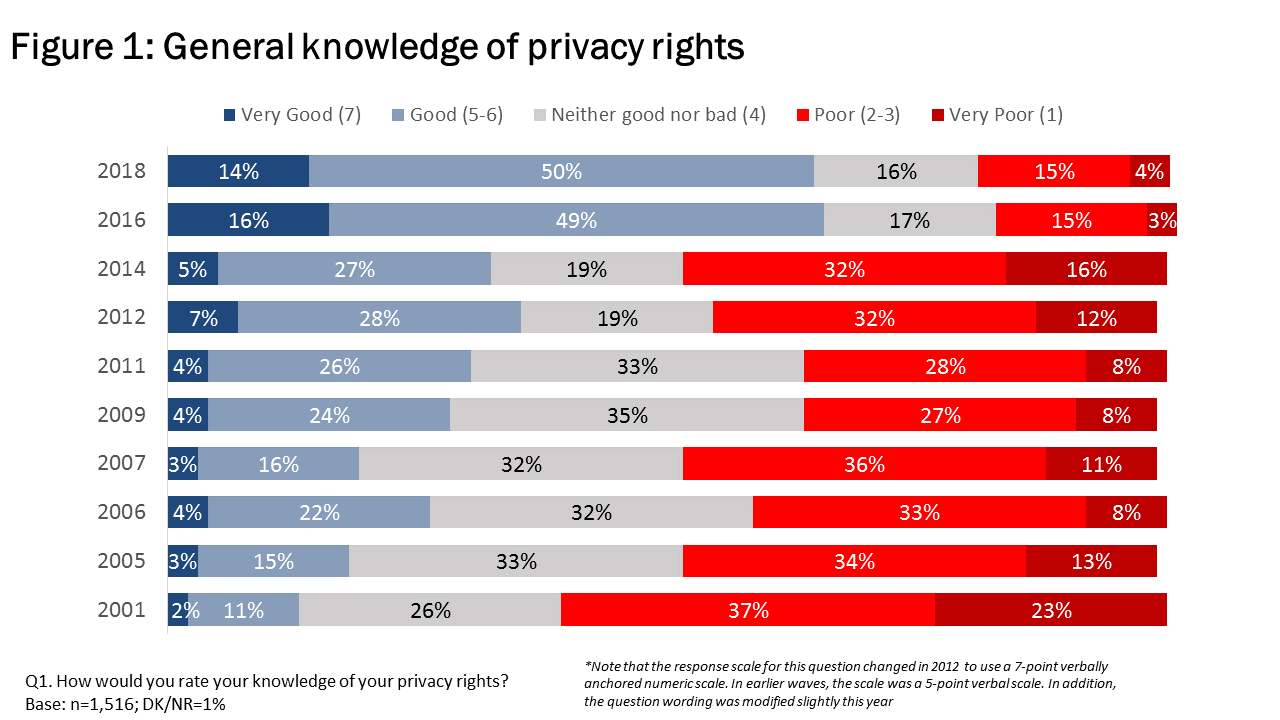
Text version of Figure 1
Figure 1: General knowledge of privacy rights
| Year | Very Good (7) |
Good (5-6) |
Neither good nor bad (4) |
Poor (2-3) |
Very Poor (1) |
|---|---|---|---|---|---|
| 2018 | 14% | 50% | 16% | 15% | 4% |
| 2016 | 16% | 49% | 17% | 15% | 3% |
| 2014 | 5% | 27% | 19% | 32% | 16% |
| 2012 | 7% | 28% | 19% | 32% | 12% |
| 2011 | 4% | 26% | 33% | 28% | 8% |
| 2009 | 4% | 24% | 35% | 27% | 8% |
| 2007 | 3% | 16% | 32% | 36% | 11% |
| 2006 | 4% | 22% | 32% | 33% | 8% |
| 2005 | 3% | 15% | 33% | 34% | 13% |
| 2001 | 2% | 11% | 26% | 37% | 23% |
* Note that the response scale for this question changed in 2012 to use a 7-point verbally anchored numeric scale. In earlier waves, the scale was a 5-point verbal scale. In addition, the question wording was modified slightly this year
Base: n=1,516; DK/NR=1%
Canadians aged 55 and older were most likely to rate their knowledge of their privacy rights as very good, particularly compared to Canadians between 25 and 54 years of age. In addition, Canadians with a high school diploma or less were more likely to rate their knowledge of their privacy rights as very good compared to Canadians with post-secondary education.
Over half of Canadians know how to protect privacy rights
Over half (57%) of Canadians surveyed rated their knowledge of how to protect their privacy rights as good (46%) or very good (11%). In contrast, one-quarter (23%) said they had poor (19%) or very poor (4%) knowledge in this regard.
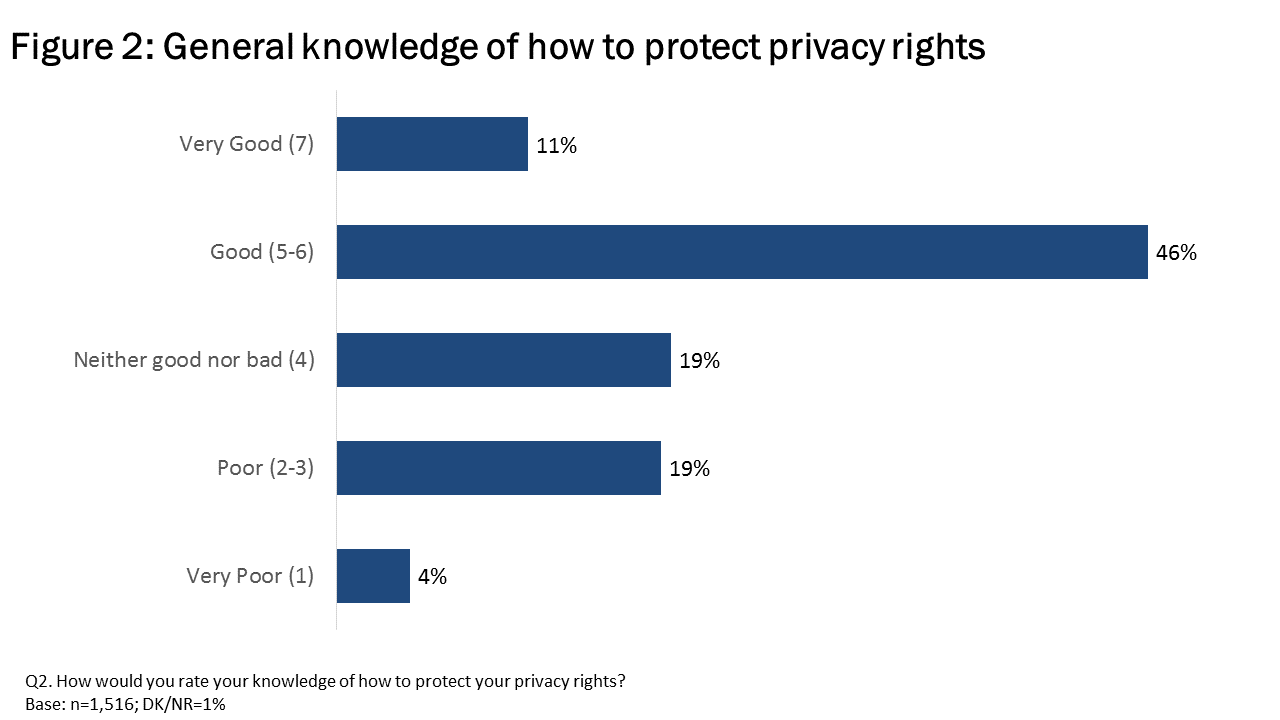
Text version of Figure 2
Figure 2: General knowledge of how to protect privacy rights
| Rate | 2018 |
|---|---|
| Very Good (7) | 11% |
| Good (5-6) | 46% |
| Neither good nor bad (4) | 19% |
| Poor (2-3) | 19% |
| Very Poor (1) | 4% |
Base: n=1,516; DK/NR=1%
Subgroup differences mirrored those evident when Canadians rated their knowledge of their privacy rights. Canadians aged 55 and older were more likely to characterize their knowledge of how to protect their privacy rights as very good compared to Canadians between the ages of 25 and 54. Canadians with a high school diploma or less were more likely to rate their knowledge of how to protect their privacy rights as very good compared to Canadians with post-secondary education.
Canadians are concerned about protecting personal privacy
The vast majority (92%) of Canadians expressed some level of concern about the protection of their privacy. Specifically, 37% are extremely concerned, 20% are concerned, and 35% are somewhat concerned. Fewer than one in 10 said they were not concerned at all. These results are unchanged from 2016. Since 2012, the proportion of Canadians who rated their level of concern as extreme has increased 12 percentage points (from 25% to 37% in 2018).
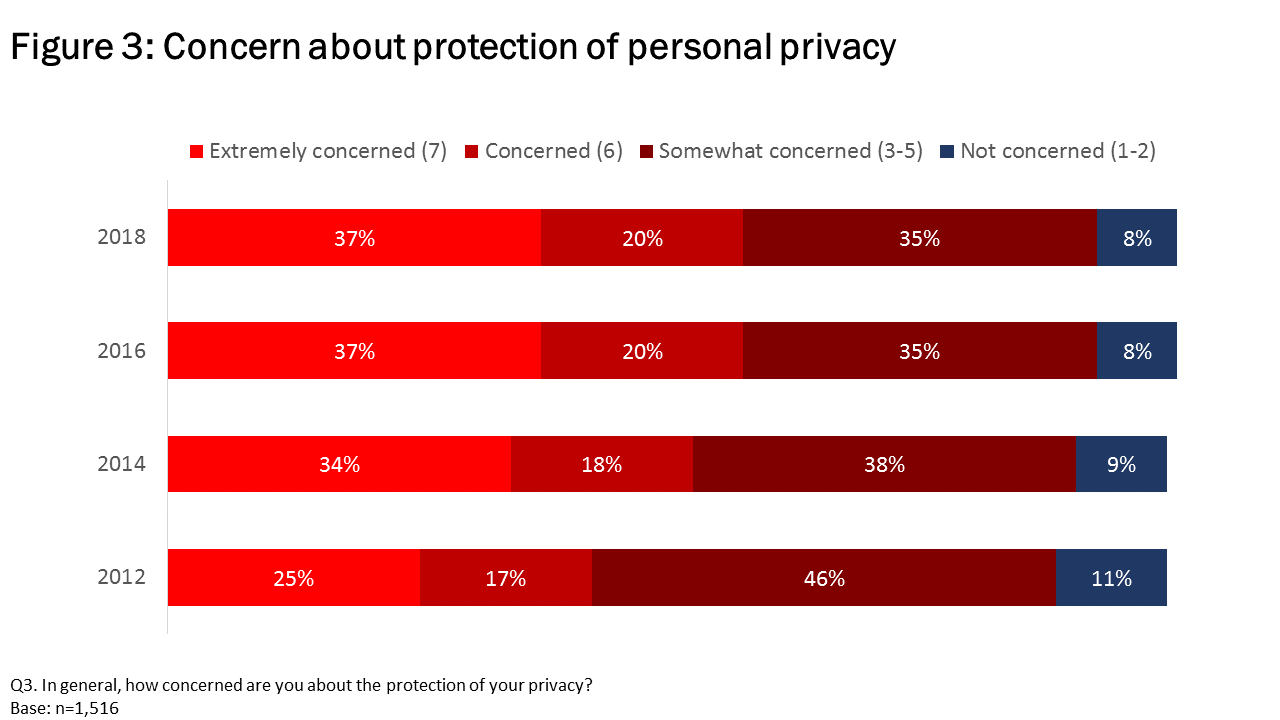
Text version of Figure 3
Figure 3: Concern about protection of personal privacy
| Year | Extremely concerned (7) |
Concerned (6) |
Somewhat concerned (3-5) |
Not concerned (1-2) |
|---|---|---|---|---|
| 2018 | 37% | 20% | 35% | 8% |
| 2016 | 37% | 20% | 35% | 8% |
| 2014 | 34% | 18% | 38% | 9% |
| 2012 | 25% | 17% | 46% | 11% |
Base: n=1,516
The likelihood of being extremely concerned about protecting personal privacy increased with age and was higher among Canadians aged 35 and older. Regionally, Canadians in the Atlantic provinces, Quebec, and the Prairies were more likely to express concern about protecting personal privacy compared to those in British Columbia.
Almost half feel confident about knowledge of how new technologies affect privacy
Nearly half (48%) of Canadians feel confident that they know enough information about how new technologies might affect their personal privacy. This represents a slight decrease from the 52% recorded in 2016. However, lack of confidence related to this issue still remains lower than the highs recoded in 2012 (40%) and 2014 (41%).
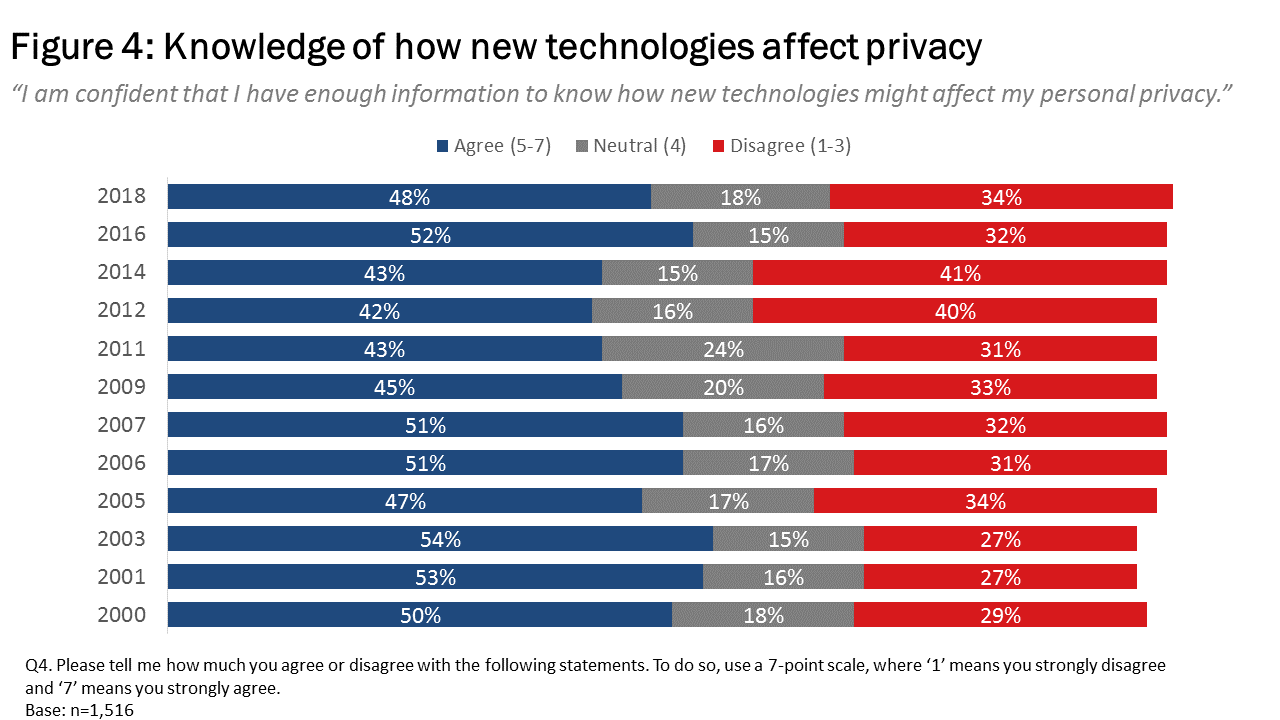
Text version of Figure 4
Figure 4: Knowledge of how new technologies affect privacy
| “I am confident that I have enough information to know how new technologies might affect my personal privacy.” | |||
| Year | Agree (5-7) |
Neutral (4) |
Disagree (1-3) |
|---|---|---|---|
| 2018 | 48% | 18% | 34% |
| 2016 | 52% | 15% | 32% |
| 2014 | 43% | 15% | 41% |
| 2012 | 42% | 16% | 40% |
| 2011 | 43% | 24% | 31% |
| 2009 | 45% | 20% | 33% |
| 2007 | 51% | 16% | 32% |
| 2006 | 51% | 17% | 31% |
| 2005 | 47% | 17% | 34% |
| 2003 | 54% | 15% | 27% |
| 2001 | 53% | 16% | 27% |
| 2000 | 50% | 18% | 29% |
Base: n=1,516
The following subgroups of Canadians were more likely to agree that they have enough information to know how new technologies might affect their personal privacy:
- Canadians residing in Quebec;
- Canadians under 25, particularly compared to Canadians 35 and older; and
- Canadians with no university degree compared to those with a university degree.
Many lack confidence in businesses respecting privacy rights
Many Canadians do not feel that businesses in general respect their privacy. A significant minority (45%) of those surveyed disagreed that businesses respect their privacy and 17% were neutral, neither agreeing nor disagreeing. Conversely, almost four in 10 (38%) feel that businesses respect their privacy rights.
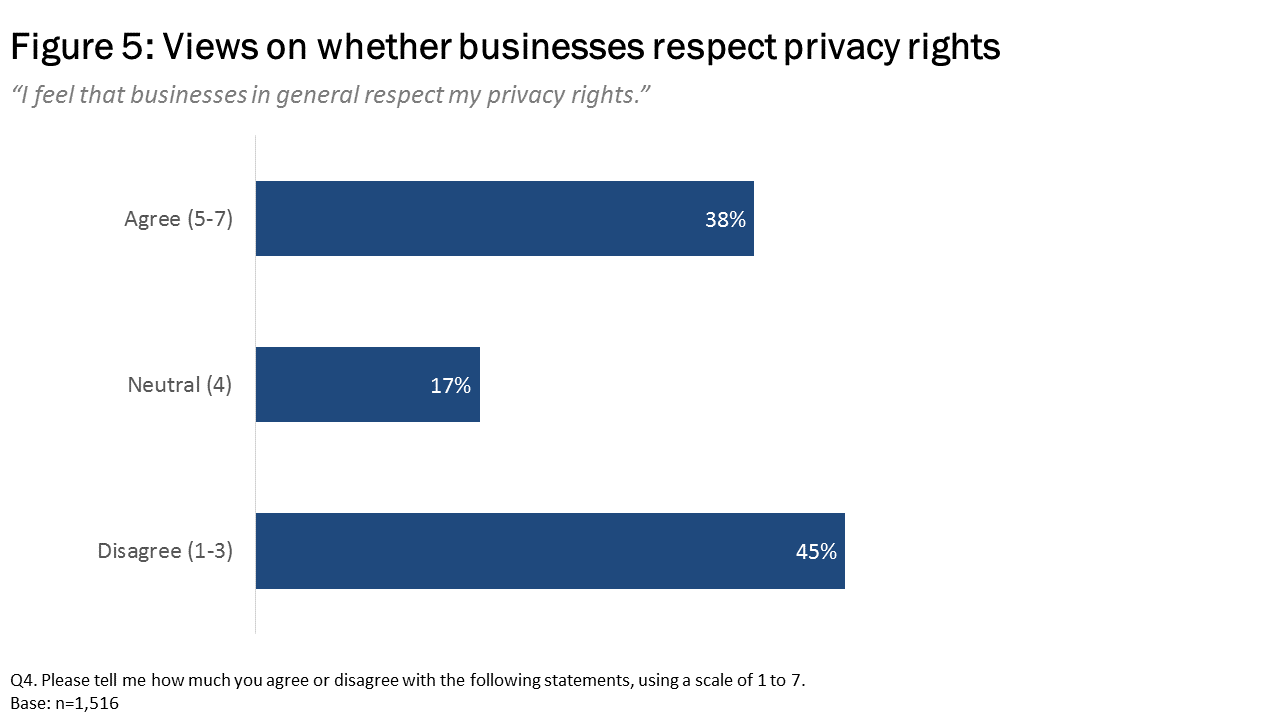
Text version of Figure 5
Figure 5: Views on whether businesses respect privacy rights
| “I feel that businesses in general respect my privacy rights.” | |
| Agreement level | % of Respondents |
|---|---|
| Agree (5-7) | 38% |
| Neutral (4) | 17% |
| Disagree (1-3) | 45% |
Base: n=1,516
Men and Canadians aged 35 to 54 (compared to Canadians under 25 and those 55+) were more likely to disagree that businesses respect their privacy rights. Conversely, Canadians with a high school diploma or less were more likely to agree that businesses respect their privacy rights compared to those with post-secondary education.
Majority are confident that government respects privacy rights
In contrast to Canadians’ perceptions of how businesses respect their privacy rights, the majority (55%) feel that the federal government respects their privacy rights. Among the rest, 29% disagreed that this is the case and 14% were neutral.
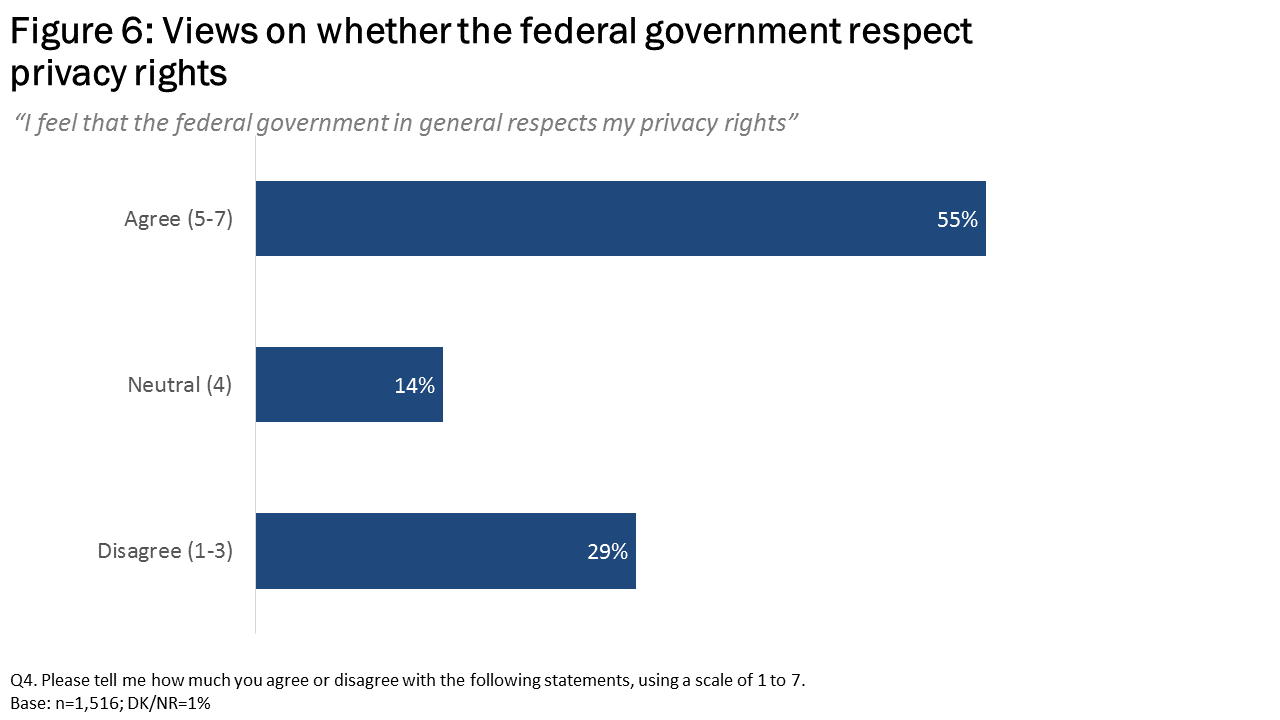
Text version of Figure 6
Figure 6: Views on whether the federal government respect privacy rights
| “I feel that the federal government in general respects my privacy rights” | ||||
| Agreement level | % of Respondents | |||
|---|---|---|---|---|
| Agree (5-7) |
55% | |||
| Neutral (4) |
14% | |||
| Disagree (1-3) |
29% | |||
Base: n=1,516; DK/NR=1%
The following subgroups of Canadians were more likely to agree that the federal government respects their privacy rights:
- Canadians residing in Quebec;
- Women; and
- Canadians under 25, particularly compared to 25 to 34 year olds and those 55+.
II. Online and Mobile Privacy
Majority of Canadians concerned about online personal information being used to make decisions about them
The vast majority of online Canadians are concerned about companies or organizations using information available online to make decisions about them, such as for a job, an insurance claim or health coverage. Roughly nine in 10 reported at least some level of concern, with 51% expressing strong concern. This year more Canadians expressed strong concern compared to 2016 (51% versus 46%).
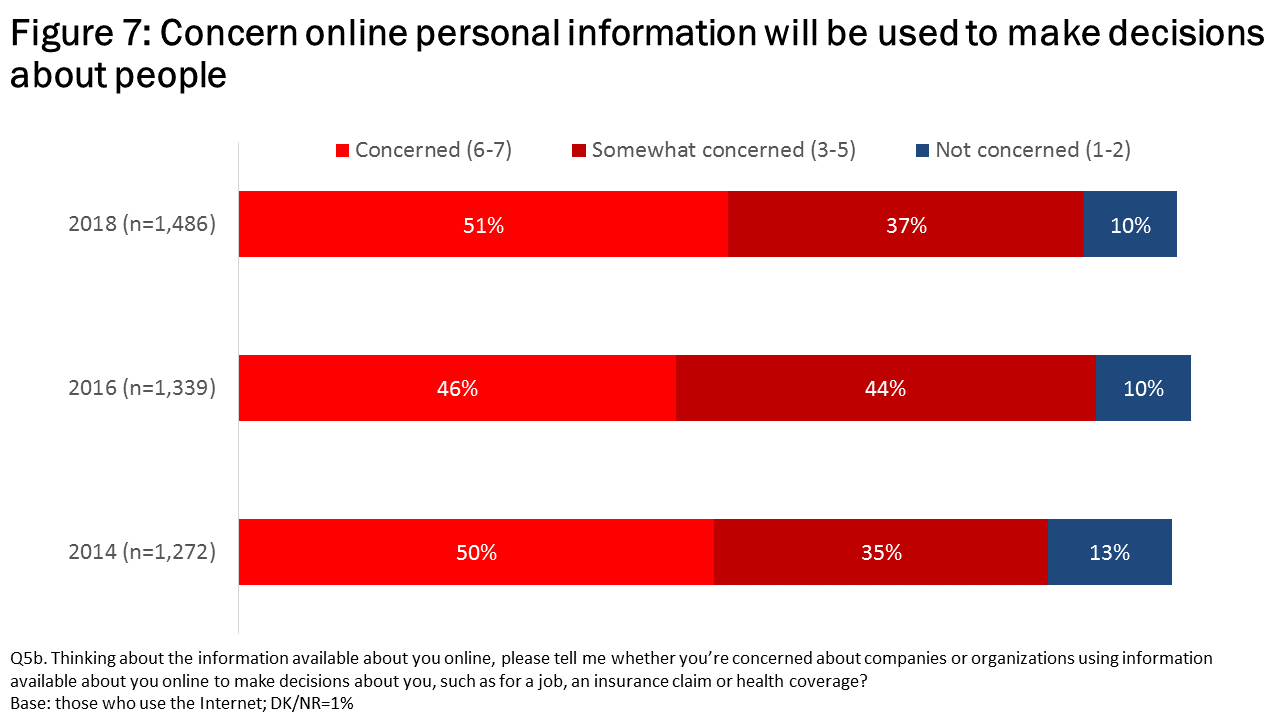
Text version of Figure 7
Figure 7: Concern online personal information will be used to make decisions about people
| Year | Concerned (6-7) |
Somewhat concerned (3-5) |
Not concerned (1-2) |
|---|---|---|---|
| 2018 (n=1,486) | 51% | 37% | 10% |
| 2016 (n=1,339) | 46% | 44% | 10% |
| 2014 (n=1,272) | 50% | 35% | 13% |
Base: those who use the Internet; DK/NR=1%
Compared to Canadians aged 35 and older, those under 35 were more likely to express concern about companies or organizations using their online personal information to make decisions about them.
Majority of Canadians are also concerned online personal information will be used by social media platforms or by people trying to steal their identity
The vast majority of Canadians are also concerned about their online personal information being used by social media platforms to create detailed profiles and by people to steal their identity. Specifically, 87% of Canadians are at least somewhat concerned about social media platforms gathering personal information that they or someone else has posted online to create a detailed profile. Slightly more—90% of Canadians—are at least somewhat concerned about people using their online information to attempt to steal their identity. Notably, more than half of surveyed Canadians are decidedly concerned (scores of 6 and 7).

Text version of Figure 8
Figure 8: Concern online personal information will be used or stolen
| Issue | Concerned (6-7) |
Somewhat concerned (3-5) |
Not concerned (1-2) |
|---|---|---|---|
| Social media platforms gathering personal information |
55% | 32% | 12% |
| People using information to attempt to steal your identity |
62% | 28% | 8% |
Base: those who use the Internet; DK/NR=1-2%
Concern over social media platforms gathering personal information to create detailed profiles increased with age and was higher among Canadians with post-secondary education. Concern over use of such information for identity theft was more likely among Canadians 35 and older compared to those under 35.
Security measures with mobile devices are taken by majority of Canadians
Three-quarters of Canadians who use mobile devices have taken steps to protect the security of their personal information. Specifically, 75% have adjusted settings to limit personal information that is shared on their mobile device and 74% have not installed or uninstalled apps because they were concerned about the personal information they were being asked to provide. Compared to 2016, fewer Canadians reported having not installed or uninstalled apps (74% in 2018 versus 82% in 2016).
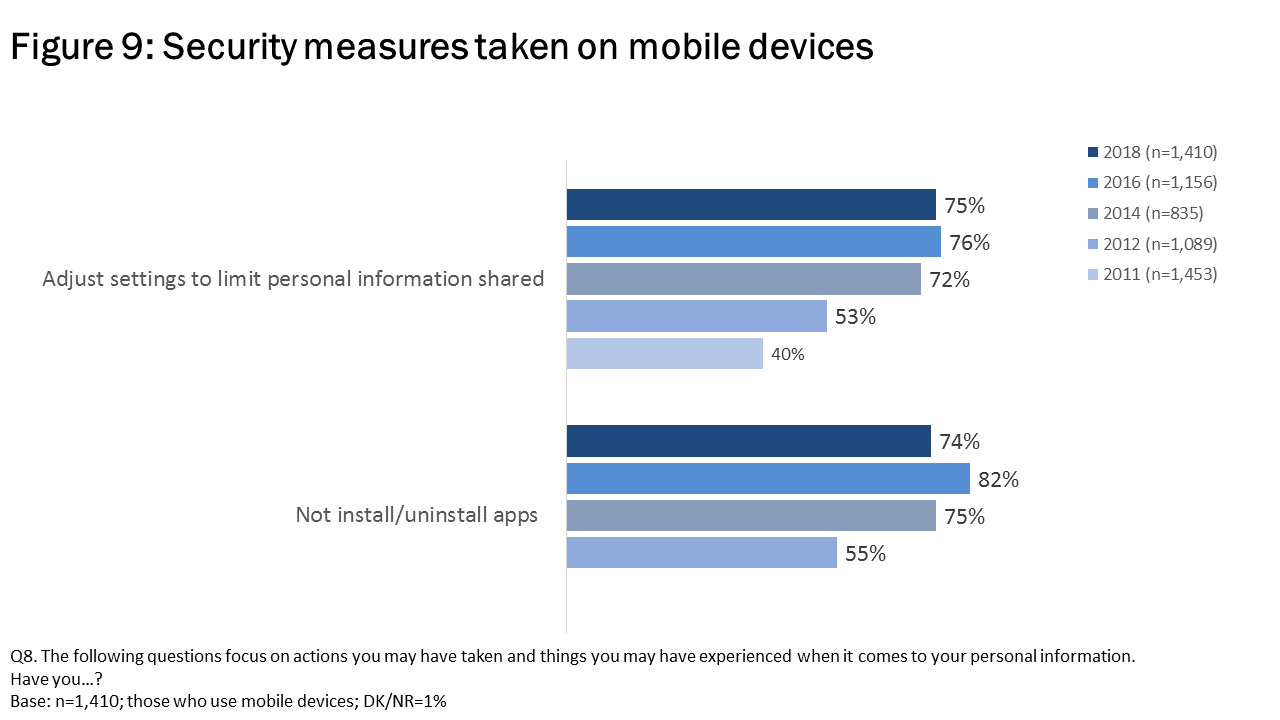
Text version of Figure 9
Figure 9: Security measures taken on mobile devices
| Actions taken | 2018 (n=1,410) |
2016 (n=1,156) |
2014 (n=835) |
2012 (n=1,089) |
2011 (n=1,453) |
|---|---|---|---|---|---|
| Adjust settings to limit personal information shared |
75% | 76% | 72% | 53% | 40% |
| Not install/uninstall apps |
74% | 82% | 75% | 55% |
Base: n=1,410; those who use mobile devices; DK/NR=1%
The likelihood of having adjusted settings on a mobile device and not installing or uninstalling apps was higher among Canadians under 55 years of age, women, and Canadians with post-secondary education. Regionally, Canadians in Ontario and the Prairies, particularly compared to Canadians in Quebec, were more likely to have adjusting settings on a mobile device and Canadians in Ontario and Quebec, particularly compared to Canadians in Atlantic Canada, were more likely to have not installed or uninstalled apps.
III. Body as Information
Moderate, but prevalent concern for sharing information about bodies
Respondents were asked to rate their level of concern about providing information about their body in different situations. Canadians are at least somewhat concerned about doing so in the following situations:
- Providing saliva for genetic testing to perform genetic testing to determine their likelihood for developing future health conditions (83%);
- Allowing their daily steps, calories burnt and heart rate to be analysed and used for commercial offers (81%);
- Providing saliva for genetic testing for ancestry (80%); and
- Having their iris scanned to speed up border crossings into Canada and the United States (75%).
When focusing on those with high levels of concern, Canadians are most likely to be very concerned about providing saliva for genetic testing (37%) as a risk to their personal privacy. Alternatively, Canadians were less likely to be very concerned about having their iris scanned in order to speed up border crossings into Canada and the United States (27%). In fact, one-quarter (24%) were not at all concerned about this act of sharing personal information.
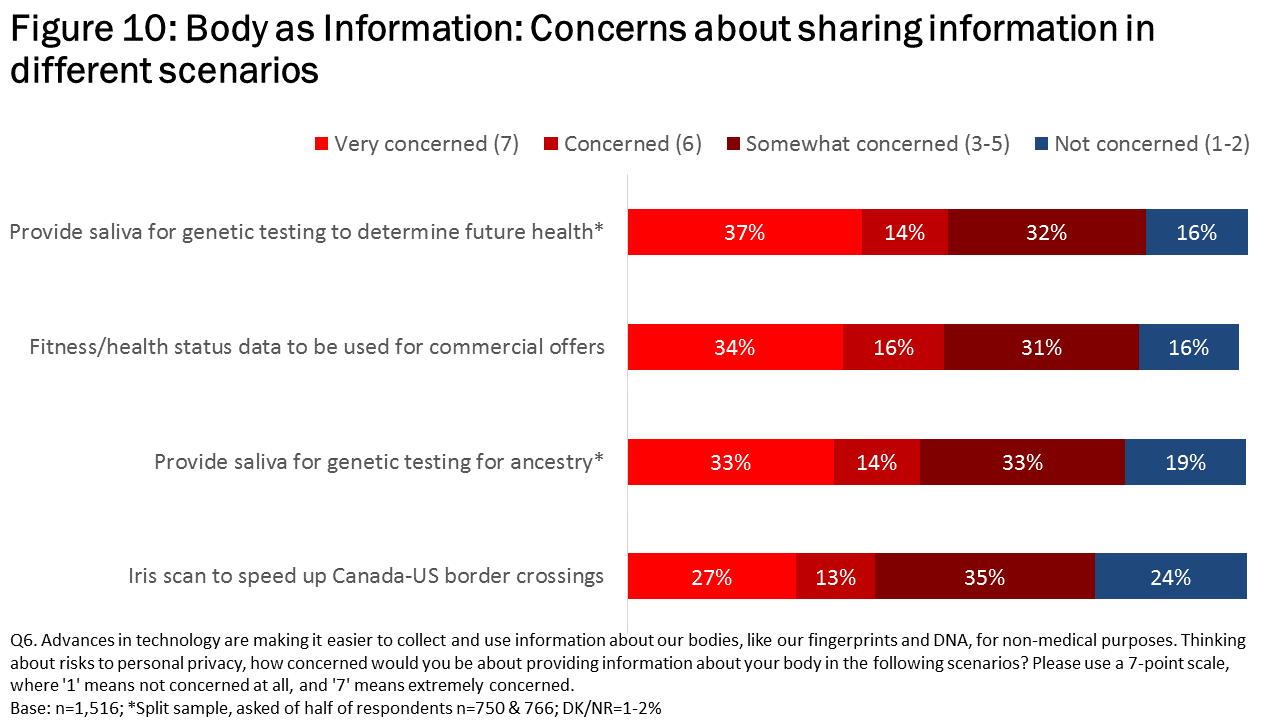
Text version of Figure 10
Figure 10: Body as Information: Concerns about sharing information in different scenarios
| Information provided |
Very concerned (7) |
Concerned (6) |
Somewhat concerned (3-5) |
Not concerned (1-2) |
|---|---|---|---|---|
| Provide saliva for genetic testing to determine future health* | 37% | 14% | 32% | 16% |
| Fitness/health status data to be used for commercial offers | 34% | 16% | 31% | 16% |
| Provide saliva for genetic testing for ancestry* | 33% | 14% | 33% | 19% |
| Iris scan to speed up Canada-US border crossings | 27% | 13% | 35% | 24% |
Base: n=1,516; * Split sample, asked of half of respondents n=750 & 766; DK/NR=1-2%
Women were more likely than men to express concern over iris scans. Canadians in Ontario and Quebec were more likely to express concern over saliva samples, particularly compared to Canadians in the Prairies and British Columbia. Concern over this was also more likely among Canadians 35 and older. Canadians 35 and older also were more likely to express concern over allowing information collected by a fitness tracker to be analyzed and used to make commercial offers to them.
Compared to 2016, a greater proportion of Canadians expressed at least some concern about providing information about their body in all of these scenarios.
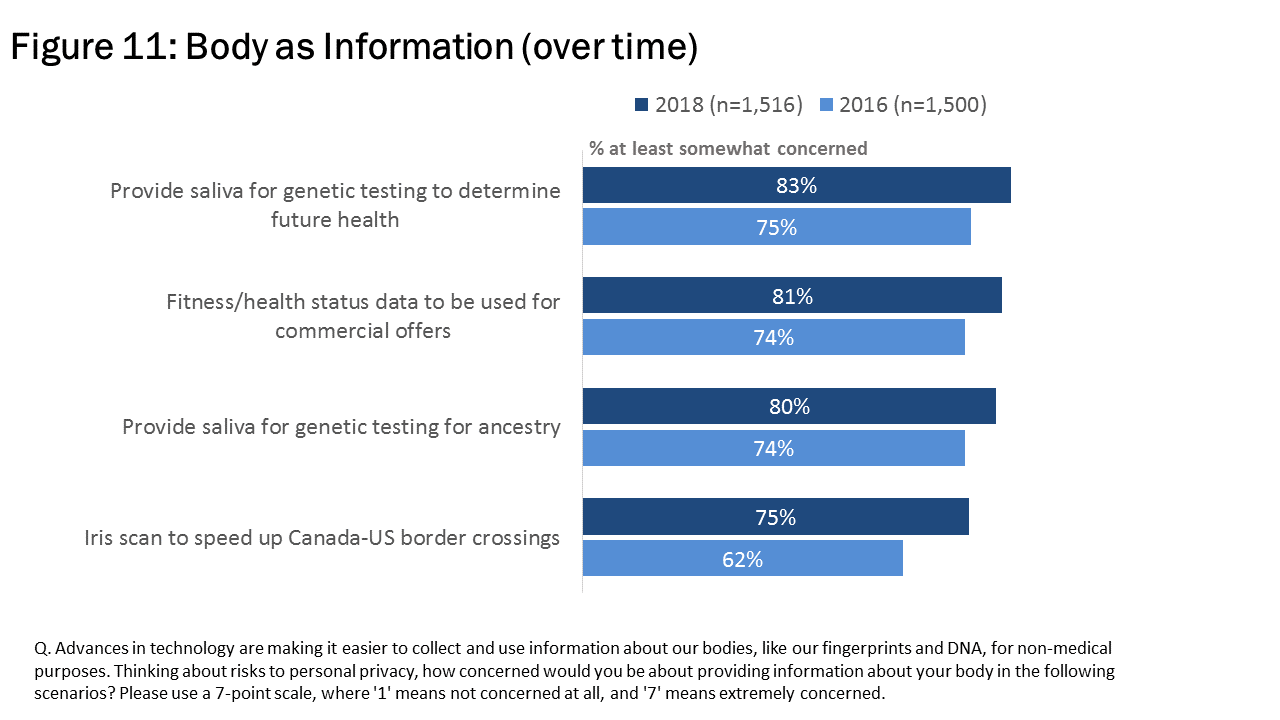
Text version of Figure 11
Figure 11: Body as information (over time)
| Information provided | 2018 (n=1,516) |
2016 (n=1,500) |
|---|---|---|
| Provide saliva for genetic testing to determine future health | 83% | 75% |
| Fitness/health status data to be used for commercial offers | 81% | 74% |
| Provide saliva for genetic testing for ancestry | 80% | 74% |
| Iris scan to speed up Canada-US border crossings | 75% | 62% |
IV. Economics of Personal Information
Fines have greatest impact on willingness to do business, but all measures viewed positively
Respondents were asked what impact the following measures would have on their willingness to do business with a company that collects their personal information:
- The company provides clear, easy to understand information about its privacy practices, including how it uses personal information.
- The company provides a menu of options you would choose from to determine how, if at all, the company could use your personal information.
- The company’s privacy practices are backed by a seal of approval provided by an independent authority on privacy protection.
- Under Canadian law, the company would face strict financial penalties, such as large fines, for misusing your personal information.
Half or more of Canadians would probably or definitely be more willing to do business with a company that collects their personal information if this company has any of these measures in place. Canadians were most likely to be influenced by financial penalties, with 40% saying this would definitely increase their willingness to do business with a company. In contrast, one-quarter (26%) felt this way about easy to understand privacy practices, and approximately one in five felt this way about a seal of approval (22%) and a menu of options to determine how (if at all) one’s personal information could be used by the company (19%).
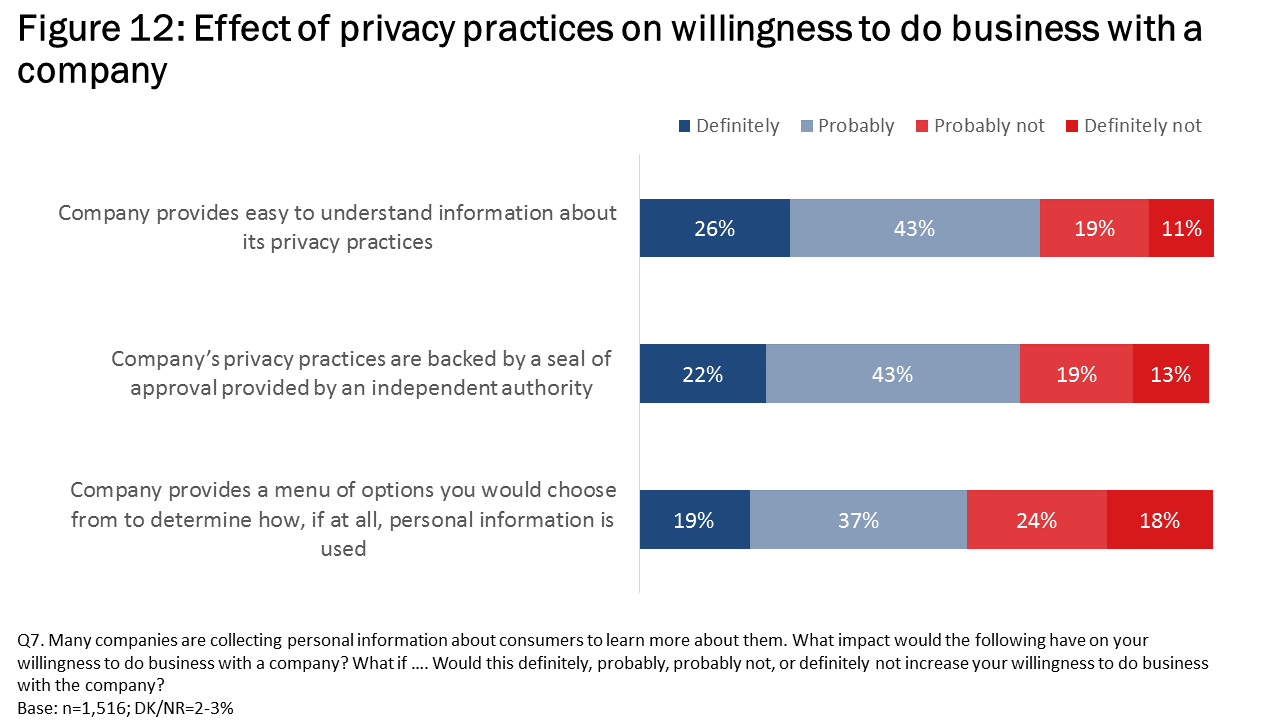
Text version of Figure 12
Figure 12: Effect of privacy practices on willingness to do business with a company
| Impact | Definitely | Probably | Probably not | Definitely not |
|---|---|---|---|---|
| Company provides easy to understand information about its privacy practices |
26% | 43% | 19% | 11% |
| Company’s privacy practices are backed by a seal of approval provided by an independent authority |
22% | 43% | 19% | 13% |
| Company provides a menu of options you would choose from to determine how, if at all, personal information is used |
19% | 37% | 24% | 18% |
Base: n=1,516; DK/NR=2-3%
Regionally, Canadians in Ontario and the Prairies were more likely than those in Quebec to say that a menu of options would probably or definitely increase their willingness to do business with a company. In addition, those in Ontario were more likely than those who reside in Atlantic Canada to say they would be influenced by financial penalties.
Measures aimed at increasing the willingness of Canadians to do business with companies that collect their personal information were less likely to resonate with Canadians aged 55 and older. These respondents were less likely than younger Canadians to say that these measures would definitely or probably increase their willingness to do business with a company that collects their personal information.
Additionally, compared to Canadians with no post-secondary education, those with a university degree were more likely to say that a menu of options and strict financial penalties would probably or definitely increase their willingness to do business with a company.
With one exception, perceptions of the impact of these measures are virtually unchanged since 2016. This year, fewer Canadians said that a menu of options would probably or definitely increase their willingness to do business with a company that collects personal information (56% in 2018 versus 60% in 2016).
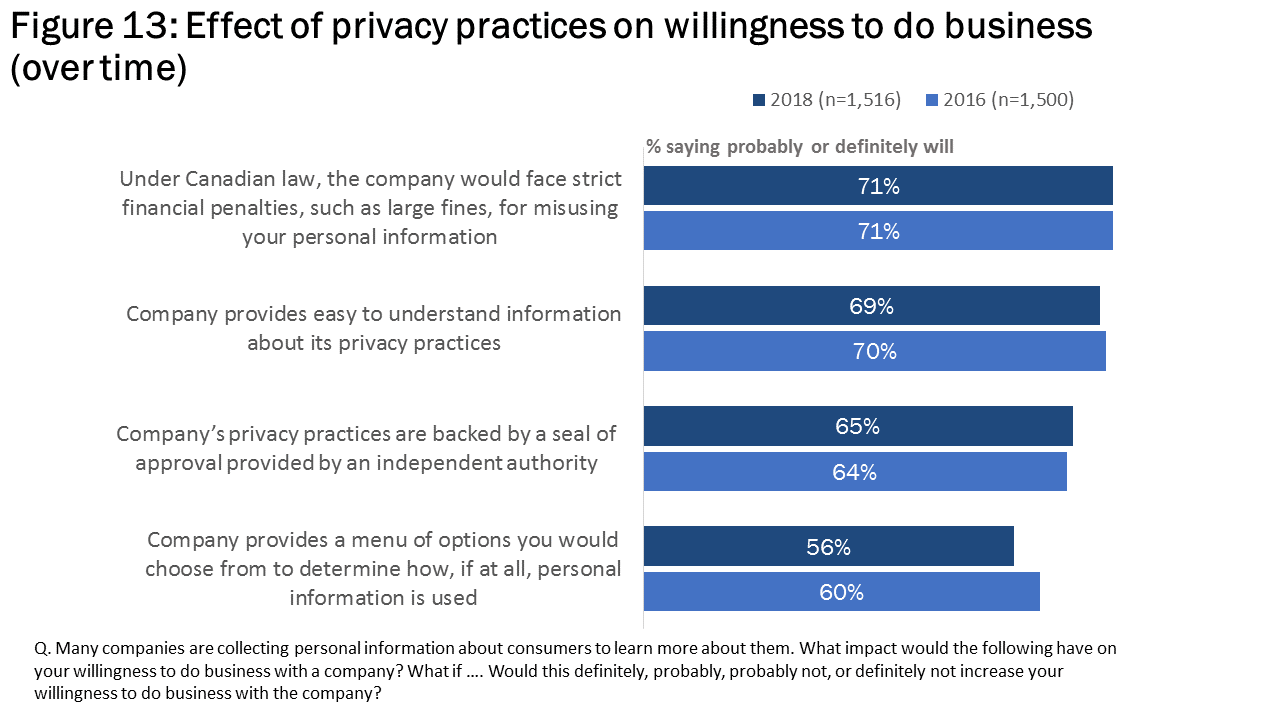
Text version of Figure 13
Figure 13: Effect of privacy practices on willingness to do business (over time)
| Privacy practices | 2018 (n=1,516) |
2016 (n=1,500) |
|---|---|---|
| Under Canadian law, the company would face strict financial penalties, such as large fines, for misusing your personal information |
71% | 71% |
| Company provides easy to understand information about its privacy practices |
69% | 70% |
| Company’s privacy practices are backed by a seal of approval provided by an independent authority |
65% | 64% |
| Company provides a menu of options you would choose from to determine how, if at all, personal information is used |
56% | 60% |
V. Canadians’ Management of their Personal Information
Three-quarters have refused to provide personal information; relatively few have change travel plans
Three-quarters (76%) of Canadians have refused to provide an organization or business with their personal information. The likelihood of refusing to provide personal information remains unchanged since 2014. In contrast, relatively few (16%) Canadians said they had made changes to their travel plans because of privacy concerns related to border crossings.
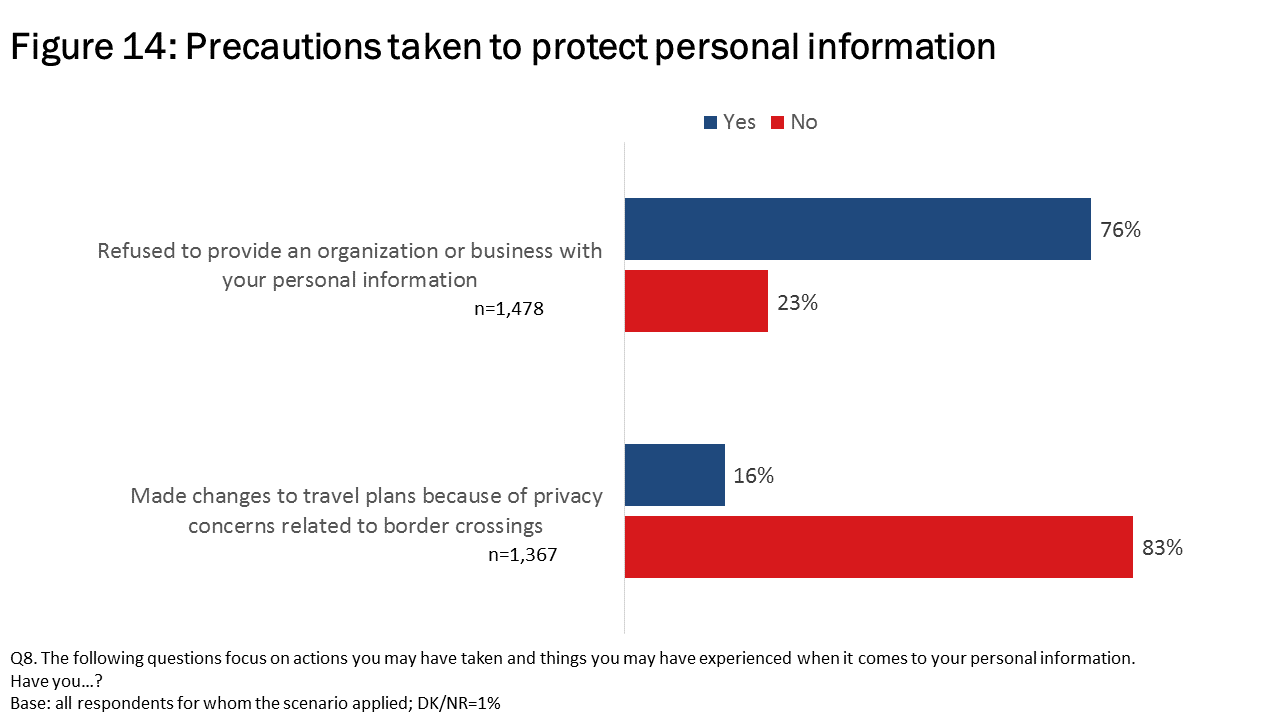
Text version of Figure 14
Figure 14: Precautions taken to protect personal information
| Actions taken | Yes | No |
|---|---|---|
| Refused to provide an organization or business with your personal information (n=1,478) |
76% | 23% |
| Made changes to travel plans because of privacy concerns related to border crossings (n=1,367) |
16% | 83% |
Base: all respondents for whom the scenario applied; DK/NR=1%
Refusing to provide personal information to an organization or business was more likely to have been done by Canadians 35-54 years of age, and Canadians with post-secondary education. The likelihood of having changed travel plans because of privacy concerns related to border crossings was higher among Canadians aged 55 and older, particularly compared to Canadians under 35.
Seven in 10 have not used personal information for gain
With regards to trading their personal information for discounts or incentives on a good or service, most Canadians (70%) said they have not done this. Conversely, three in 10 have done so.
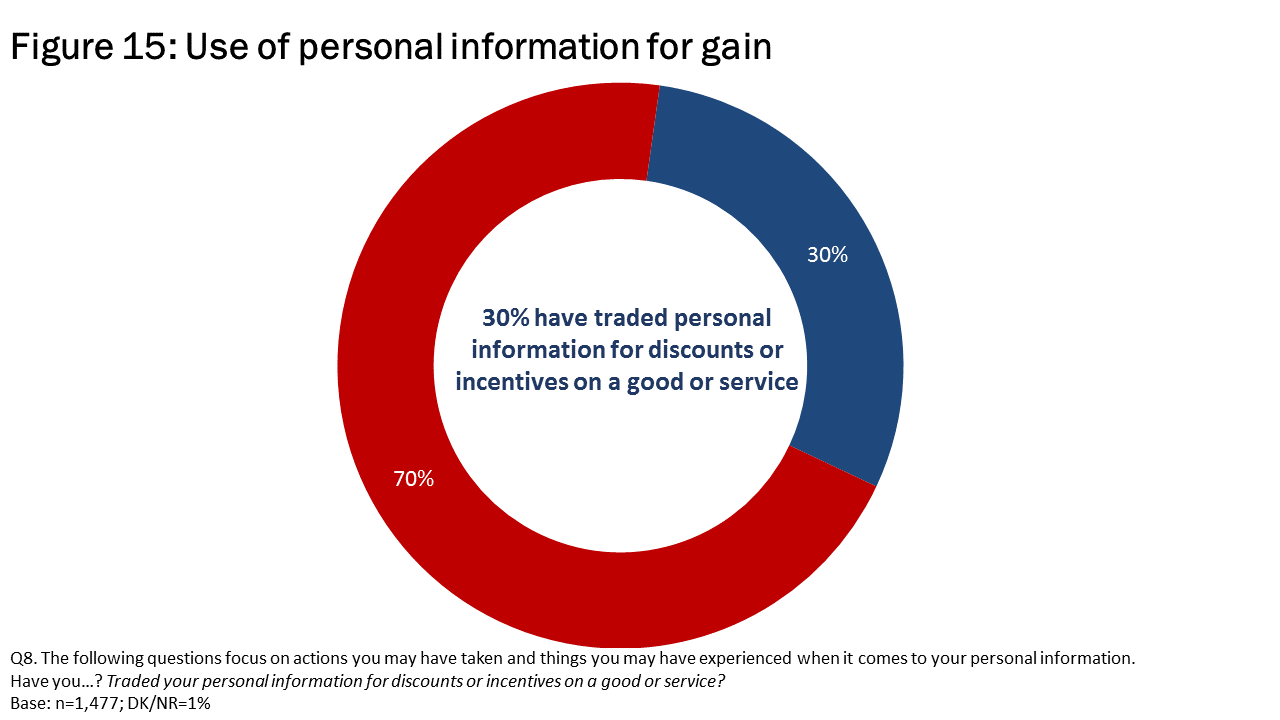
Text version of Figure 15
Figure 15: Use of personal information for gain
| Traded your personal information for discounts or incentives on a good or service? | ||
| Actions taken | Yes | No |
|---|---|---|
| Traded personal information for discounts or incentives on a good or service |
30% | 70% |
Base: n=1,477; DK/NR=1%
Canadians under 55 years of age, women, and those with post-secondary education were more likely to have said that they traded information for discounts or incentives.
News reports on privacy breaches make Canadians unwilling to share information
More than eight in 10 (84%) Canadians said news reports about privacy breaches have affected how willing they are to share personal information, and least somewhat. Thirty-four percent said it has affected them a great deal.
These results are virtually unchanged from 2016, and similar to those of 2014, when 31% of Canadians said their willingness to share information was affected a great deal by news reports on privacy breaches.
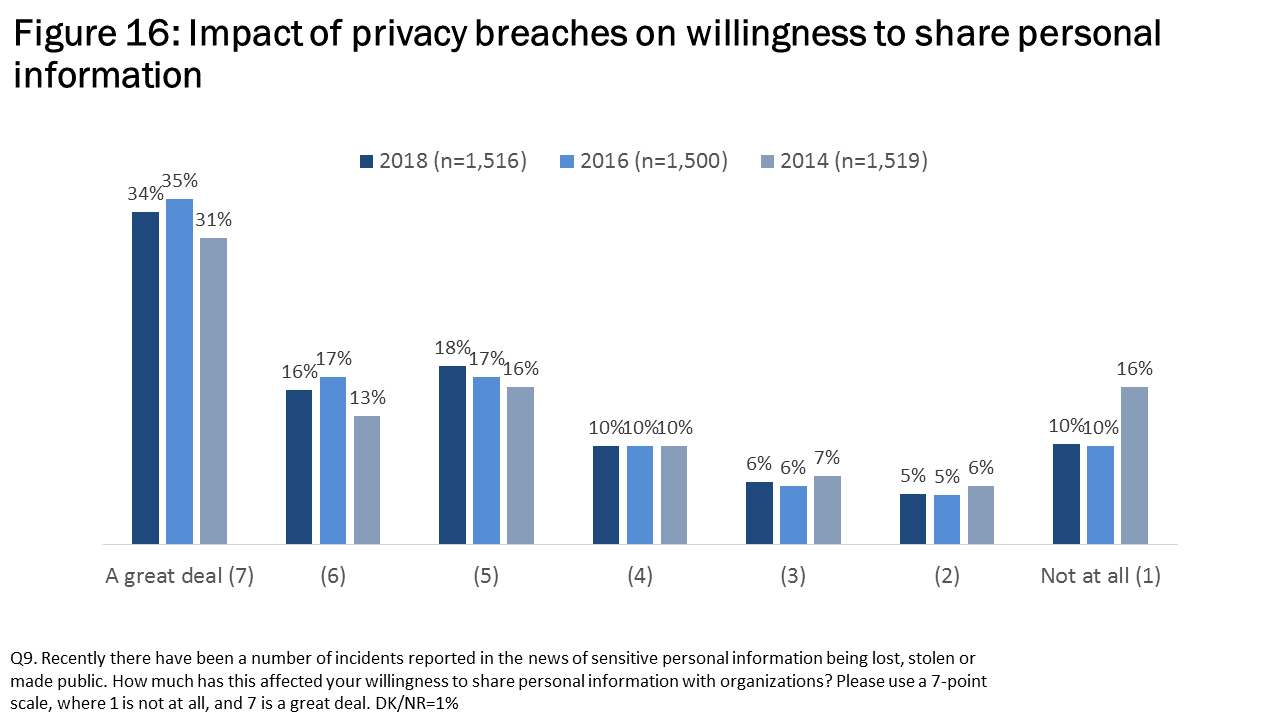
Text version of Figure 16
Figure 16: Impact of privacy breaches on willingness to share personal information
| Willingness to share | 2018 (n=1,516) |
2016 (n=1,500) |
2014 (n=1,519) |
|---|---|---|---|
| A great deal (7) | 34% | 35% | 31% |
| (6) | 16% | 17% | 13% |
| (5) | 18% | 17% | 16% |
| (4) | 10% | 10% | 10% |
| (3) | 6% | 6% | 7% |
| (2) | 5% | 5% | 6% |
| Not at all (1) | 10% | 10% | 16% |
DK/NR=1%
The likelihood of recent news reports about such incidents affecting willingness to share personal information with organizations increased with age.
VI. Government Transparency
Three in 10 claim good understanding of how the Government of Canada uses citizens’ personal information
Three in 10 (29%) Canadians have a good understanding of what the Government of Canada does with the personal information it collects from citizens (up from 24% recorded in 2016). The majority do not: 56% agreed with the statement and 14% were neutral (neither agreeing nor disagreeing).
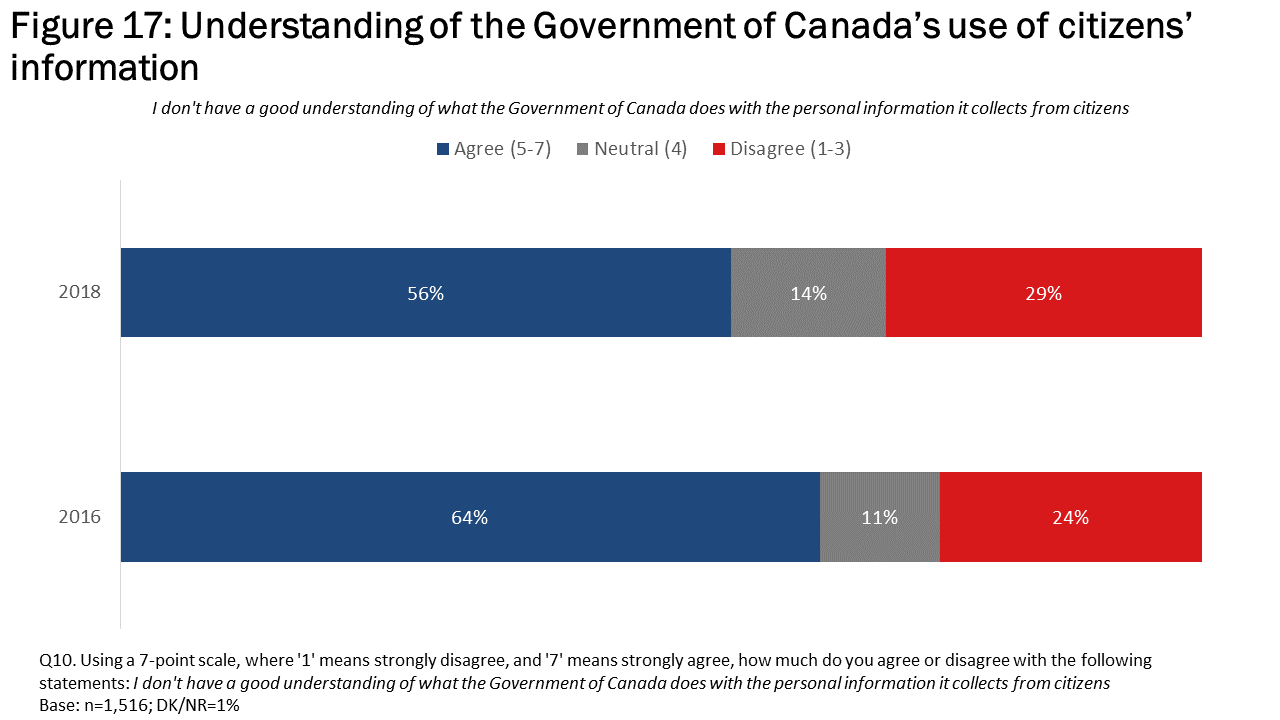
Text version of Figure 17
Figure 17: Understanding of the Government of Canada’s use of citizens’ information
| I don't have a good understanding of what the Government of Canada does with the personal information it collects from citizens |
||
| Level of understanding | 2016 | 2018 |
|---|---|---|
| Agree (5-7) | 64% | 56% |
| Neutral (4) | 11% | 14% |
| Disagree (1-3) | 24% | 29% |
Base: n=1,516; DK/NR=1%
Agreement about lacking a good understanding of what the Government of Canada does with their personal information was higher in the Prairies, particularly compared to Canadians in Quebec, while strong agreement about this was more likely among Canadians 25 and older.
Poor knowledge of information collected, used or disclosed by intelligence-gathering activities
Approximately one-third (35%) of Canadians agreed that they have a good understanding of how personal information is treated as part of intelligence-gathering activities. In contrast, 50% do not understand what information is collected, used or disclosed by intelligence-gathering activities in Canada (and the remainder, 14%, were neutral).
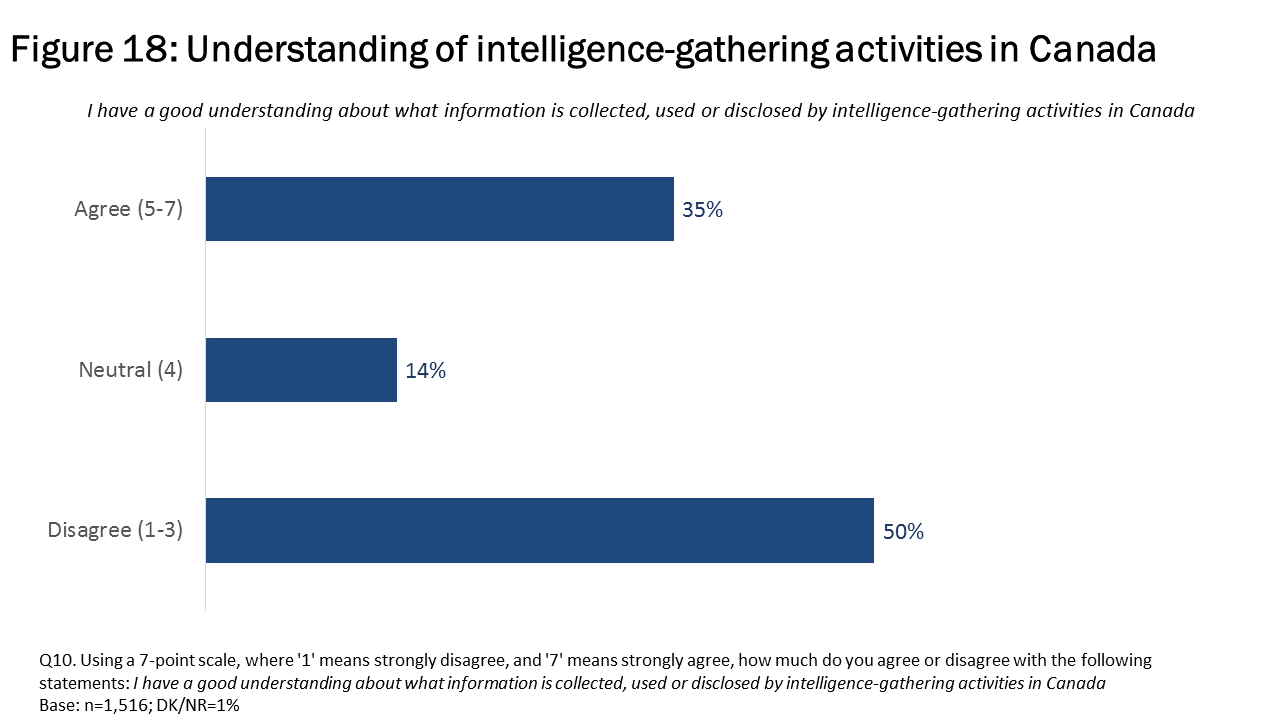
Text version of Figure 18
Figure 18: Understanding of intelligence-gathering activities in Canada
| I have a good understanding about what information is collected, used or disclosed by intelligence-gathering activities in Canada |
|||
| Level of understanding | Agree (5-7) |
Neutral (4) |
Disagree (1-3) |
|---|---|---|---|
| I have a good understanding about what information is collected, used or disclosed by intelligence-gathering activities in Canada |
35% | 14% | 50% |
Base: n=1,516; DK/NR=1%
The likelihood of having a good understanding concerning information collected, used, or disclosed by intelligence-gathering activities in Canada was higher among Canadians in Quebec and Canadians without a university degree.
Mediocre knowledge of sources used by the Government of Canada to collect online personal information
One-third (33%) of Canadians agreed that they have a good understanding of the sources that the Government of Canada uses to collect personal information about individuals that is available online. In contrast, 48% do not understand what sources are used by the Government of Canada (and the remainder, 17%, were neutral).
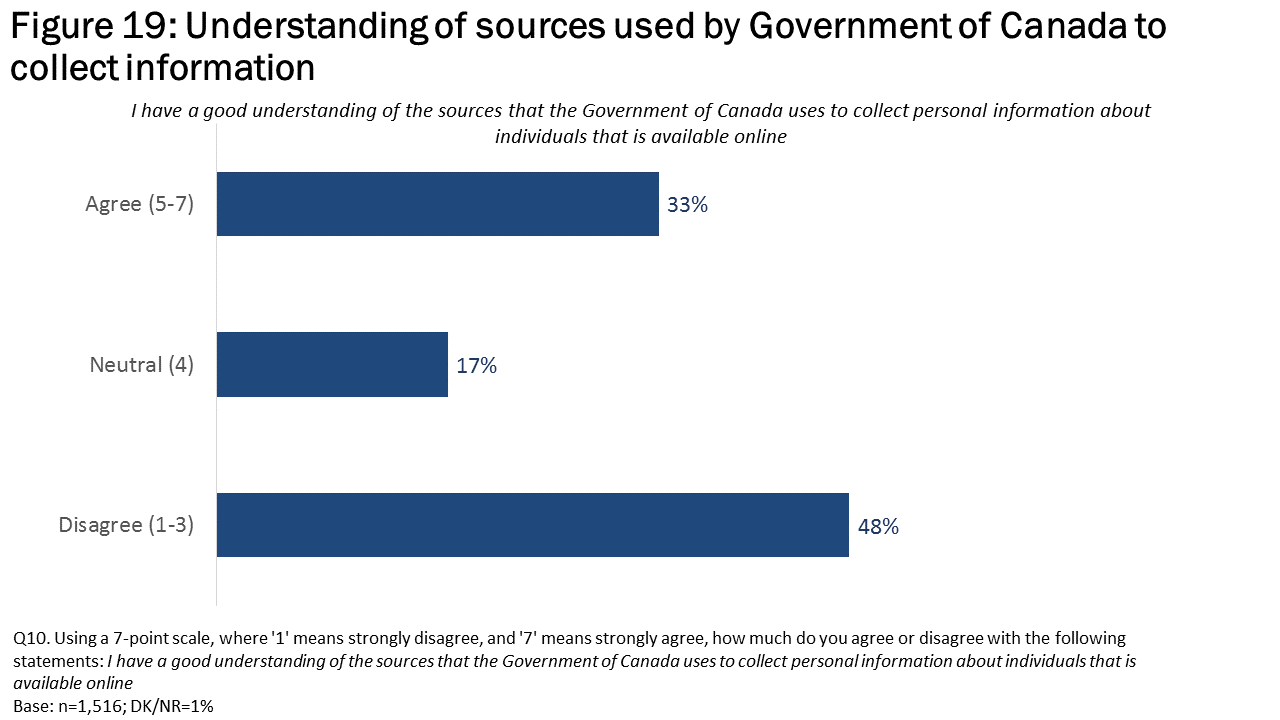
Text version of Figure 19
Figure 19: Understanding of sources used by Government of Canada to collect information
| I have a good understanding of the sources that the Government of Canada uses to collect personal information about individuals that is available online |
|||
| Level of understanding | Agree (5-7) |
Neutral (4) |
Disagree (1-3) |
|---|---|---|---|
| I have a good understanding about what information is collected, used or disclosed by intelligence-gathering activities in Canada |
33% | 17% | 48% |
Base: n=1,516; DK/NR=1%
Agreement about having a good understanding of the sources that the Government of Canada uses to collect personal information about individuals that is available online was also higher among Canadians in Quebec (particularly compared to those west of that province), and Canadians without a university degree.
Mixed reactions to Government of Canada sharing personal information
Respondents were asked to rate their level of comfort with the personal information that they give to a Government of Canada department being shared in the following ways:
- with another department of the Government of Canada without your consent
- with another department of the Government of Canada with your consent
- with another department of the Government of Canada for some purpose that you’re not aware of
- with your provincial / territorial government
- with foreign governments or authorities.
The majority of Canadians would not be comfortable with the Government of Canada sharing their personal information with foreign governments or authorities (75%), with another department of the Government of Canada without their consent (64%), or with another department of the Government of Canada for some purpose that they’re not aware of (60%).
In contrast, eight in 10 (81%) said they would be at least somewhat comfortable with the Government of Canada sharing their personal information with another department of the Government of Canada with their consent. Fewer, but still a majority (63%), felt this way about the Government of Canada sharing information with their provincial or territorial government. In both scenarios, Canadians were more likely to be somewhat rather than decidedly comfortable with information sharing.
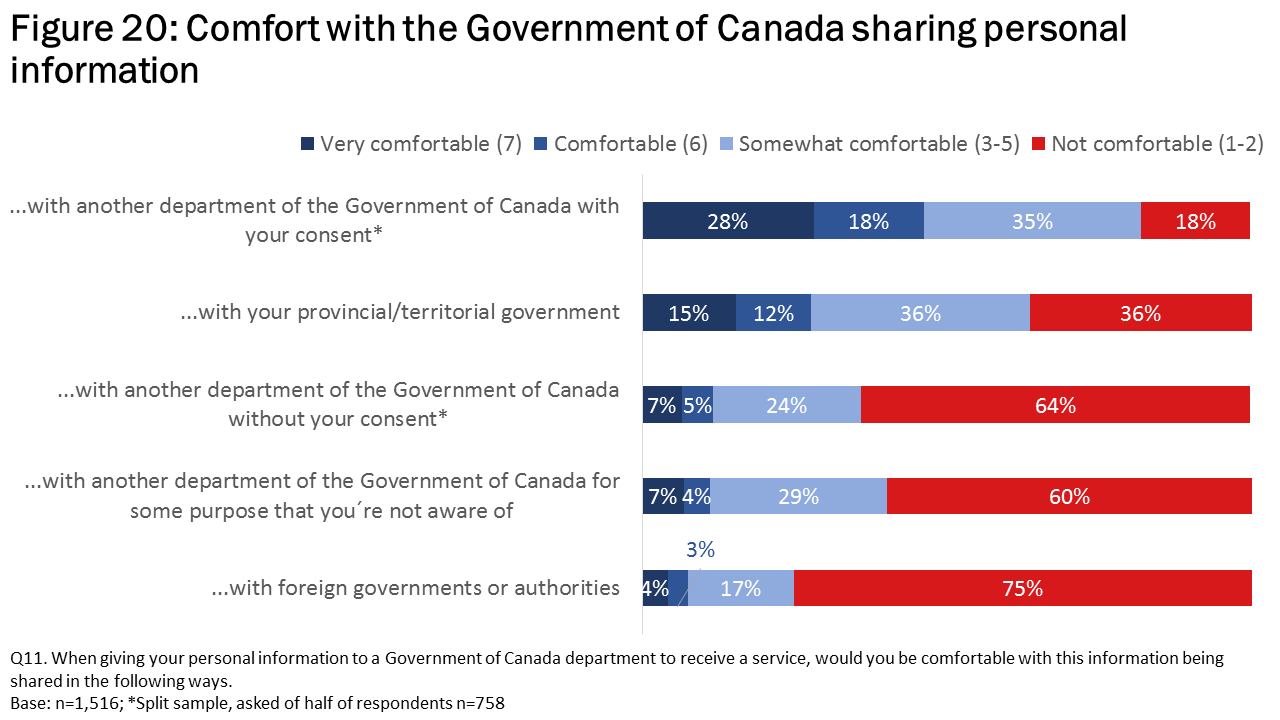
Text version of Figure 20
Figure 20: Comfort with the Government of Canada sharing personal information
| Level of sharing | Very comfortable (7) |
Comfortable (6) |
Somewhat comfortable (3-5) |
Not comfortable (1-2) |
|---|---|---|---|---|
| …with another department of the Government of Canada with your consent* | 28% | 18% | 35% | 18% |
| …with your provincial/territorial government | 15% | 12% | 36% | 36% |
| …with another department of the Government of Canada without your consent* | 7% | 5% | 24% | 64% |
| …with another department of the Government of Canada for some purpose that you´re not aware of | 7% | 4% | 29% | 60% |
| …with foreign governments or authorities | 4% | 3% | 17% | 75% |
Base: n=1,516; *Split sample, asked of half of respondents n=758
Compared to Canadians residing in other parts of the country, those in Quebec were more likely to be comfortable with the Government of Canada sharing their personal information in all these scenarios.
Canadians without post-secondary education (especially compared to those with post-secondary education but no university degree) were more likely to be comfortable with the Government of Canada sharing their personal information with another federal department without their consent and with foreign governments or authorities. In contrast, comfort with the idea of the Government of Canada sharing their personal information with another federal department with their consent was more likely among Canadians with a university degree.
Canadians aged 55 and older were more likely to be not comfortable with the Government of Canada sharing their personal information in all these scenarios.
VII. Control and Ownership
Canadians feel lack of control over use of personal information
The majority of Canadians feel they have little to no control over how their personal information is being used by either companies (67%) or by government (61%). Approximately three in 10 believe they have no control at all: 27% said this about companies and 31% about government.
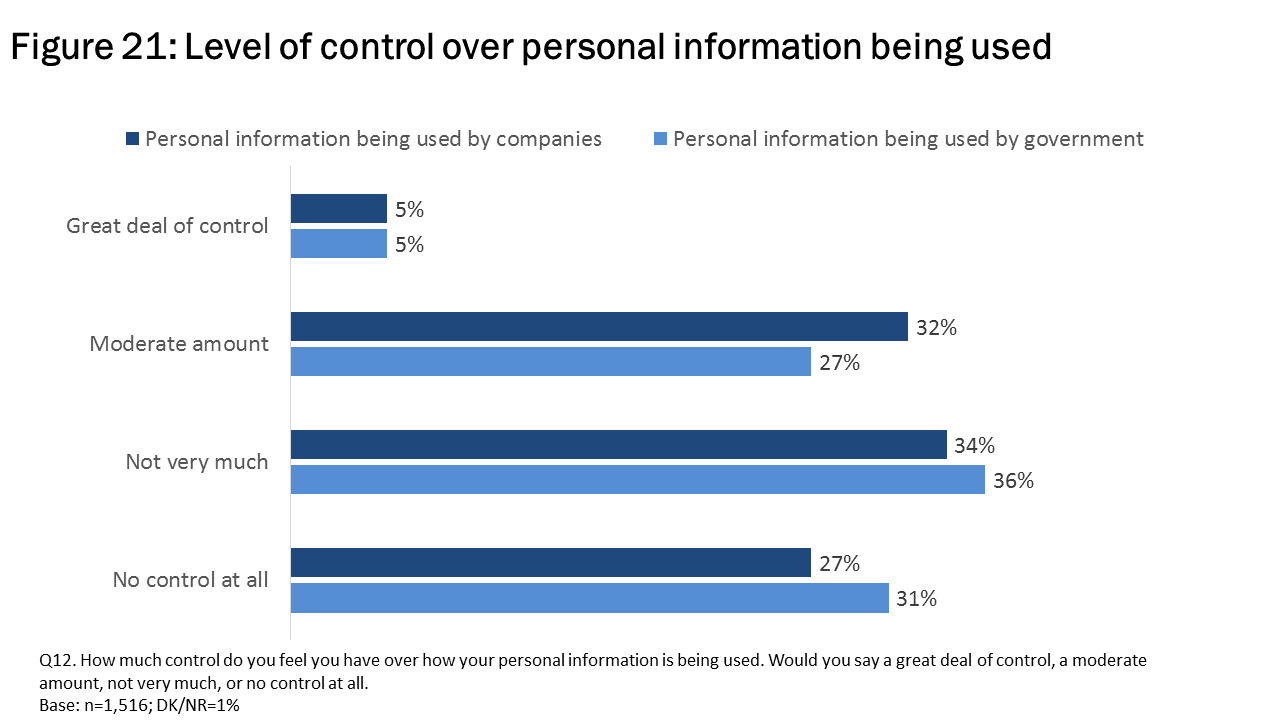
Text version of Figure 21
Figure 21: Level of control over personal information being used
| Level of control | Personal information being used by companies |
Personal information being used by government |
|---|---|---|
| Great deal of control | 5% | 5% |
| Moderate amount | 32% | 27% |
| Not very much | 34% | 36% |
| No control at all | 27% | 31% |
Base: n=1,516; DK/NR=1%
Feelings that they exercise at least some control over how their personal information is used by companies were more likely among Canadians in Quebec (particularly compared to those in British Columbia), Canadians under 35 (particularly compared to those 55 and older), and Canadians without post-secondary education.
Feelings that they exercise at least some control over how their personal information is used by government were more likely among Canadians in the Atlantic region and Quebec (particularly compared to those in Ontario), and Canadians under the age of 25 (particularly compared to those 35 and older).
Government seen as the agent that should be responsible for privacy protection
Respondents were asked which of the following should be responsible for helping them protect their personal information:
- Companies because they’re collecting your personal information and are responsible for the way they handle it.
- Government because it is independent and can represent your interests.
Approximately two-thirds (67%) said government should be responsible, whereas one-quarter (25%) said companies. Six percent volunteered that they did not know who should be responsible.
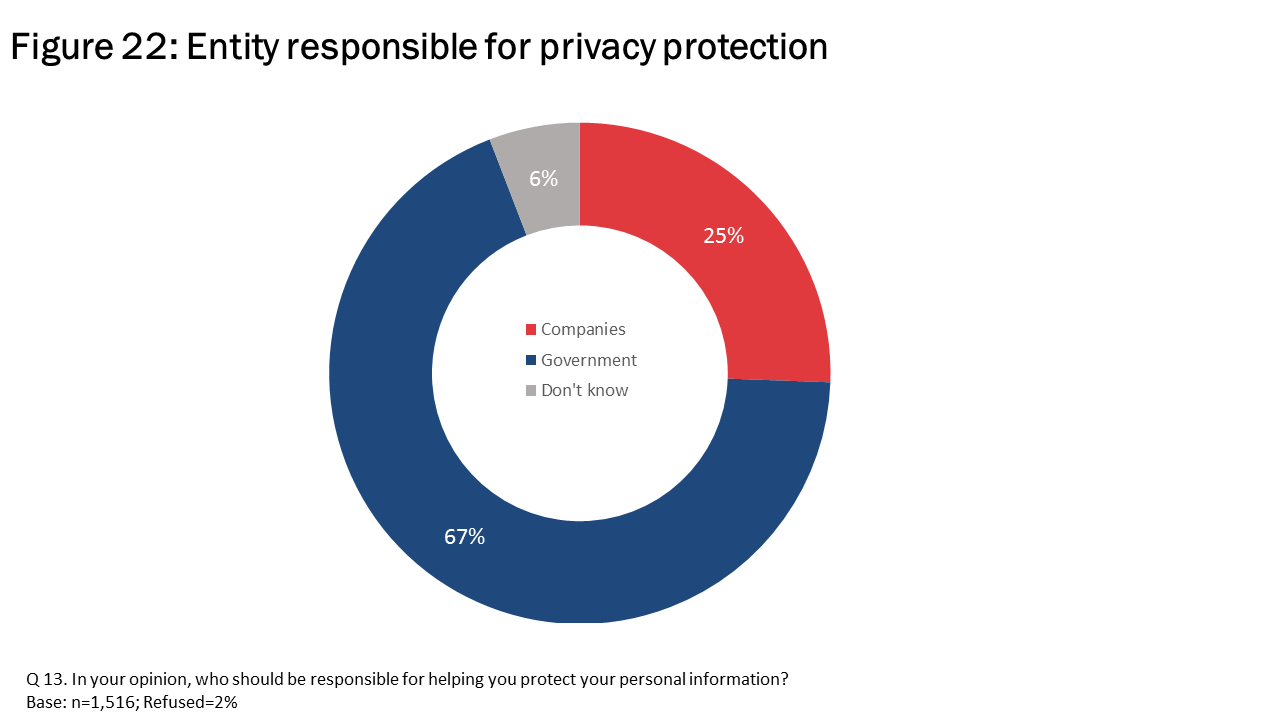
Text version of Figure 22
Figure 22: Entity responsible for privacy protection
| Responsible | % |
|---|---|
| Companies | 25% |
| Government | 67% |
| Don't know | 6% |
Base: n=1,516; Refused=2%
Impressions that companies should be responsible for helping them protect their personal information were more likely among Canadians in Ontario and the Prairies (particularly compared to those in Quebec), Canadians under the age of 25 (particularly compared to those 35 and older), and Canadians without a university degree. Conversely, impressions that government should be responsible for this were more likely among Canadian in Quebec (particularly compared to those in the Prairies), and Canadians with a university degree.
Disagreement high with regards to companies sharing personal information unrelated to providing services
Canadians express strong disagreement with the idea of companies being able to share their personal information for purposes other than to provide them with a service. The vast majority disagreed that companies should be able to do this: 64% disagreed strongly and 22% somewhat. Fewer than one in five expressed any level of agreement with this proposition.
Respondents were read the following example as part of the question:
For example, this information could be used within the company to sell you other products and offer you savings or it could be provided to other companies.
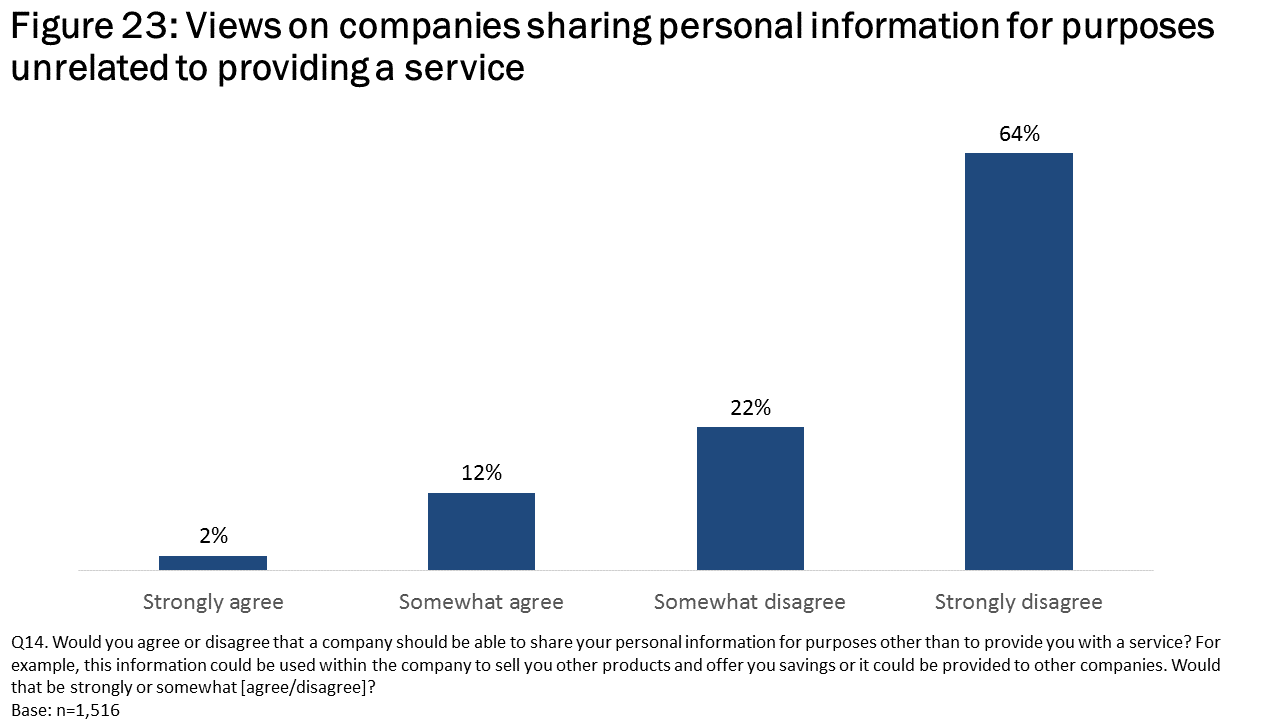
Text version of Figure 23
Figure 23: Views on companies sharing personal information for purposes unrelated to providing a service
| Level of sharing | % |
|---|---|
| Strongly agree | 2% |
| Somewhat agree | 12% |
| Somewhat disagree | 22% |
| Strongly disagree | 64% |
Base: n=1,516
Disagreement that a company should have a right to share their personal information for purposes other than providing them with a service was more likely among Canadians in British Columbia (particularly compared to those in the Atlantic region), women, and Canadians aged 35 and older.
Appendix
Survey Questionnaire
Introduction
Hello, my name is [Interviewer's name]. I’m calling on behalf of Phoenix SPI, a public opinion research company. We are conducting a survey for the Government of Canada on issues of interest to Canadians. Would you prefer to continue in English or French? / Préférez-vous continuer en anglais ou en français?
The survey takes about 10 minutes and is voluntary. Your responses will be kept entirely confidential and anonymous.
[LANDLINE SAMPLE]
A. We choose telephone numbers at random and then select one person from each household to be interviewed. To do this, we would like to speak to the person in your household, 16 years of age or older, who has had the most recent birthday. Would that be you?
No - ASK TO SPEAK TO ELIGIBLE PERSON; REPEAT INTRO
[CELL SAMPLE]
B. Are you 16 years of age or older?
No - THANK/DISCONTINUE
C. Are you in a place where you can safely talk on the phone and answer my questions?
No - ASK D
D. We would like to conduct this interview with you when it is safe and convenient to do. When would it be more convenient for me to call back?
[EVERYONE]
E. Do you work in any of the following areas? [READ LIST]
The media (i.e. TV, radio, newspapers)
THANK/DISCONTINUE IF ANY OF THE ABOVE
THANK/DISCONTINUE MESSAGE: “Thank you for your willingness to take part in this survey, but you do not meet the eligibility requirements of this study.”
F. In which province or territory do you live?
Prince Edward Island
Nova Scotia
New Brunswick
Quebec
Ontario
Manitoba
Saskatchewan
Alberta
British Columbia
Yukon
Northwest Territories
Nunavut
PROGRAMMING NOTES:
- Accept Don’t know and Refused for all questions if volunteered by a respondent.
- Record Don’t know and Refused separately for all questions.
- Section headings should not be read to respondents.
- Reveal the name of the department that commissioned the survey at the end of the survey only.
- If the respondent questions the validity of the research, invite the respondent to call [Patrick Samson] of the Government of Canada at [819-994-5682] or Alethea Woods of Phoenix SPI 613-260-1700, ext. 223.
Knowledge, Concern and General Perceptions
Many of the questions in this survey are about privacy and the protection of personal information. Personal information includes things like your name, income, and email address, as well as information like your purchasing habits and online activities.
- How would you rate your knowledge of your privacy rights? Please use a scale of 1 to 7, where '1' means very poor and '7' means very good.
- Using the same scale of 1 to 7, how would you rate your knowledge of how to protect your privacy rights?
- In general, how concerned are you about the protection of your privacy? Please use a scale of 1 to 7, where ‘1’ means not concerned at all, and ‘7’ means extremely concerned.
- Please tell me how much you agree or disagree with the following statements. To do so, use a 7-point scale, where ‘1’ means you strongly disagree and ‘7’ means you strongly agree. [READ/ROTATE]
- I feel that businesses in general respect my privacy rights.
- I feel that the federal government in general respects my privacy rights.
- I am confident that I have enough information to know how new technologies might affect my personal privacy.
Online and Mobile Privacy
These next questions deal with issues related to online and mobile privacy.
[IF A RESPONDENT VOLUNTEERS THAT HE/SHE DOES NOT USE THE INTERNET OR HAVE A MOBILE DEVICE, RECORD THIS AND SKIP TO Q6.]
- Thinking about the information available about you online, please tell me whether you’re concerned about each of the following. To do so, I’d like you to use a 7-point scale, where ‘1’ means you’re not at all concerned and ‘7’ means you’re extremely concerned. How about… [READ/ROTATE]
- Social media platforms gathering personal information that you or someone else has posted online to create a detailed profile of your interests and personal traits.
- Companies or organizations using information available about you online to make decisions about you, such as for a job, an insurance claim or health coverage.
- People using information available about you online to attempt to steal your identity.
Body as Information
- Advances in technology are making it easier to collect information about our bodies, like our fingerprints, for non-medical purposes. Thinking about personal privacy, are you concerned about providing information about your body in the following scenarios? Please use the same 7-point scale, where ‘1’ means you’re not at all concerned and ‘7’ means you’re extremely concerned.
- Having your iris scanned to speed up border crossings into Canada and the United States.
- Providing a sample of your saliva to a company to perform genetic testing to help you learn more about your ancestry. [SPLIT SAMPLE B + C]
- Providing a sample of your saliva to a company to perform genetic testing to determine your likelihood for developing future health conditions. [SPLIT SAMPLE B + C]
- Allowing information collected by your fitness tracker to be analyzed and used to make you commercial offers.
Economics of Personal Information
- Many companies are collecting personal information about consumers to learn more about them. What impact would the following have on your willingness to do business with a company? What if …. [READ ITEM/ROTATE]? Would this definitely, probably, probably not, or definitely not increase your willingness to do business with the company?
- The company provides easy to understand information about its privacy practices.
- The company provides a menu of options you would choose from to determine how the company could use your personal information.
- The company’s privacy practices are backed by a seal of approval provided by an independent authority on privacy protection.
- Under Canadian law, the company would face strict financial penalties for misusing your personal information.
Canadians’ Actions and Experiences
- The following questions focus on actions you may have taken and things you may have experienced when it comes to your personal information. Have you:… ? ROTATE ITEMS; RECORD YES/NO; ACCEPT DOES NOT APPLY IF VOLUNTEERED.
- Adjusted settings on your mobile device to limit the personal information you share?
- Not installed, or uninstalled apps when concerned about the personal information you were asked to provide?
- Traded your personal information for discounts or incentives on a good or service?
- Refused to provide an organization or business with your personal information?
- Made changes to your travel plans because of privacy concerns related to border crossings? This could be anything from deciding not to travel across a border at all or deciding not to bring your mobile device with you across a border.
- Recently there have been a number of incidents reported in the news of sensitive personal information being lost, stolen or made public. How much has this affected your willingness to share personal information with organizations? Please use a 7-point scale, where 1 is not at all, and 7 is a great deal.
Government Transparency
- Using a 7-point scale, where '1' means strongly disagree, and '7' means strongly agree, how much do you agree or disagree with the following statements: [READ/ROTATE]
- I don’t have a good understanding of what the Government of Canada does with the personal information it collects from citizens.
- I have a good understanding about what information is collected, used or disclosed by intelligence-gathering activities in Canada.
- I have a good understanding of the sources that the Government of Canada uses to collect personal information about individuals that is available online, such as, in some instances, social media posts.
- When giving your personal information to a Government of Canada department to receive a service, would you be comfortable with this information being shared in the following ways?
Use a 7-point scale where ‘1’ is not at all comfortable and ‘7’ is very comfortable. How about [INSERT ITEM} [REPEAT SCALE AS NEEDED AFTER THE FIRST ITEM IS READ]
[ROTATE ITEMS]- with another department of the Government of Canada [SPLIT SAMPLE: without / with] your consent?
- with another department of the Government of Canada for some purpose that you’re not aware of?
- with your [provincial / territorial*] government?
- with foreign governments or authorities?
Control and ownership
Changes in technology enable businesses to collect more personal information from you and other Canadians, and to use it in a greater variety of ways. This trend will continue into the future.
- How much control do you feel you have over how your personal information is being used [READ ITEM/ROTATE]. Would you say a great deal of control, a moderate amount, not very much, or no control at all?
- by companies you do business with?
- by government?
- In your opinion, who should be responsible for helping you protect your personal information? [READ OPTIONS]
- Companies because they’re collecting your personal information and are responsible for the way they handle it.
- Government because it is independent and can represent your interests.
- Would you agree or disagree that a company should be able to share your personal information for purposes other than to provide you with a service? For example, this information could be used within the company to sell you other products and offer you savings or it could be provided to other companies. Would that be strongly or somewhat [agree/disagree]?
Demographics
The last few questions are for classification purposes only.
- In what year were you born?
Record year:
- What language do you speak most often at home?
English
French
Other - What is the highest level of formal education that you have completed? [READ LIST]
Grade 8 or less
Some high school
High School diploma or equivalent
Registered Apprenticeship or other trades certificate or diploma
College, CEGEP or other non-university certificate or diploma
University certificate or diploma below bachelor's level
Bachelor's degree
Postgraduate degree above bachelor's level
[DO NOT READ] Prefer not to answer
That concludes the survey. Thank you very much for your thoughtful feedback. It is much appreciated. This survey was conducted on behalf of the Office of the Privacy Commissioner of Canada.
Record by observation:
- Gender
- Language of interview
- Date modified:

